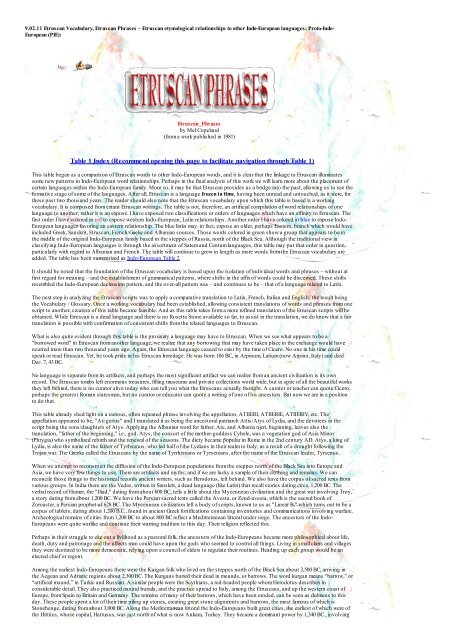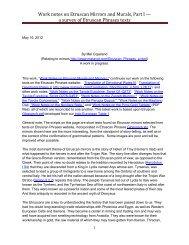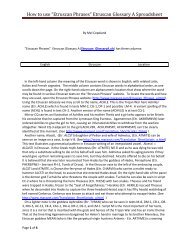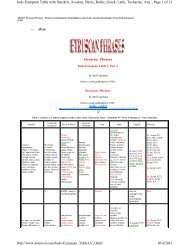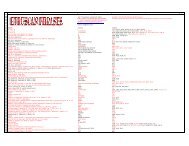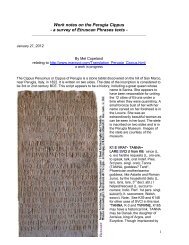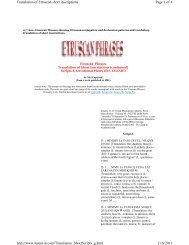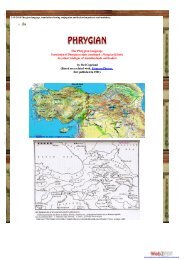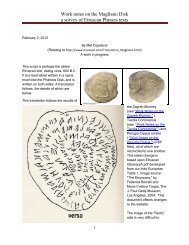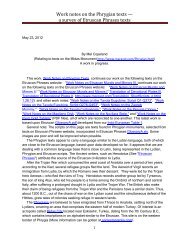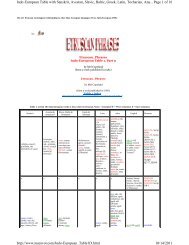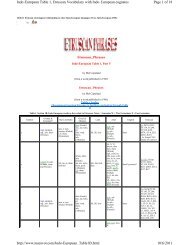Indo-European Table 1, Etruscan Vocabulary ... - maravot.com
Indo-European Table 1, Etruscan Vocabulary ... - maravot.com
Indo-European Table 1, Etruscan Vocabulary ... - maravot.com
You also want an ePaper? Increase the reach of your titles
YUMPU automatically turns print PDFs into web optimized ePapers that Google loves.
9.02.11 <strong>Etruscan</strong> <strong>Vocabulary</strong>, <strong>Etruscan</strong> Phrases – <strong>Etruscan</strong> etymological relationships to other <strong>Indo</strong>-<strong>European</strong> languages; Proto-<strong>Indo</strong>-<br />
<strong>European</strong> (PIE):<br />
<strong>Etruscan</strong>_Phrases<br />
by Mel Copeland<br />
(from a work published in 1981)<br />
<strong>Table</strong> 1 Index (Re<strong>com</strong>mend opening this page to facilitate navigation through <strong>Table</strong> 1)<br />
This table began as a <strong>com</strong>parison of <strong>Etruscan</strong> words to other <strong>Indo</strong>-<strong>European</strong> words, and it is clear that the linkage to <strong>Etruscan</strong> illuminates<br />
some new patterns in <strong>Indo</strong>-<strong>European</strong> word relationships. Perhaps in the final analysis of this work we will learn more about the placement of<br />
certain languages within the <strong>Indo</strong>-<strong>European</strong> family. More so, it may be that <strong>Etruscan</strong> provides us a bridge into the past, allowing us to see the<br />
formative stage of some of the languages. After all, <strong>Etruscan</strong> is a language frozen in time, having been unread and untouched, as it were, for<br />
these past two thousand years. The reader should also note that the <strong>Etruscan</strong> vocabulary upon which this table is based is a working<br />
vocabulary. It is <strong>com</strong>posed from extant <strong>Etruscan</strong> writings. The table is not, therefore, an artificial <strong>com</strong>pilation of word relationships of one<br />
language to another; rather it is an exposé. I have exposed two classifications or orders of languages which have an affinity to <strong>Etruscan</strong>. The<br />
first order I have colored in red to expose western <strong>Indo</strong>-<strong>European</strong>, Latin relationships. Another order I have colored in blue to expose <strong>Indo</strong>-<br />
<strong>European</strong> languages favoring an eastern relationship. The blue links may, in fact, expose an older, perhaps Eastern, branch which would have<br />
included Greek, Sanskrit, <strong>Etruscan</strong>, French/Gaelic and Albanian sources. Those words colored in green show a group that appears to be in<br />
the middle of the original <strong>Indo</strong>-<strong>European</strong> family based in the steppes of Russia, north of the Black Sea. Although the traditional view in<br />
classifying <strong>Indo</strong>-<strong>European</strong> languages is through the assortment of Satem and Centum languages, this table may put that order in question,<br />
particularly with regard to Albanian and French. The table will continue to grow in length as more words from the <strong>Etruscan</strong> vocabulary are<br />
added. The table has been summarized as <strong>Indo</strong>-<strong>European</strong> <strong>Table</strong> 2.<br />
It should be noted that the foundation of the <strong>Etruscan</strong> vocabulary is based upon the isolation of individual words and phrases – without at<br />
first regard for meaning – and the establishment of grammatical patterns, where shifts in the affix of words could be discerned. These shifts<br />
resembled the <strong>Indo</strong>-<strong>European</strong> declension pattern, and the over-all pattern was – and continues to be – that of a language related to Latin.<br />
The next step in analyzing the <strong>Etruscan</strong> scripts was to apply a <strong>com</strong>parative translation to Latin, French, Italian and English; the result being<br />
the <strong>Vocabulary</strong> / Glossary. Once a working vocabulary had been established, allowing consistent translations of words and phrases from one<br />
script to another, creation of this table became feasible. And as this table takes form a more refined translation of the <strong>Etruscan</strong> scripts will be<br />
obtained. While <strong>Etruscan</strong> is a dead language and there is no Rosetta Stone available so far, to assist in the translation, we do know that a fair<br />
translation is possible with confirmation of consistent shifts from the related languages to <strong>Etruscan</strong>.<br />
What is also quite evident through this table is the proximity a language may have to <strong>Etruscan</strong>. When we see what appears to be a<br />
"borrowed word" in <strong>Etruscan</strong> from another language, we realize that any borrowing that may have taken place in the exchange would have<br />
ocurred more than two thousand years ago. Again, the <strong>Etruscan</strong> language ceased to exist by the time of Cicero. No one in his time could<br />
speak or read <strong>Etruscan</strong>. Yet, he took pride in his <strong>Etruscan</strong> hereitage. He was born 106 BC, in Arpinum, Latium (now Arpino, Italy) and died<br />
Dec. 7, 43 BC.<br />
No language is separate from its artifacts, and perhaps the most significant artifact we can realize from an ancient civilization is its own<br />
record. The <strong>Etruscan</strong> tombs left enormous treasures, filling museums and private collections world wide, but in spite of all the beautiful works<br />
they left behind, there is no curator alive today who can tell you what the <strong>Etruscan</strong>s actually thought. A curator or teacher can quote Cicero,<br />
perhaps the greatest Roman statesman, but no curator or educator can quote a writing of one of his ancestors. But now we are in a position<br />
to do that.<br />
This table already shed light on a curious, often repeated phrase involving the appellation, ATIIERI, ATIIERIE, ATIIERIV, etc. The<br />
appellation appeared to be, "Ati gerius" and I translated it as being the ancestoral patriarch Attis/Atys of Lydia, and the devotees in the<br />
script being the sons/daughters of Atys. Applying the Albanian word for father, Ate, and Albania njeri, beginning, leaves also the<br />
translation, "father of the beginning," i.e., god. Atys, the consort of the mother-goddess Cybele, was a vegetation god of Asia Minor<br />
(Phrygia) who symbolized rebirth and the renewal of the seasons. The diety became popular in Rome in the 2nd century AD. Atys, a king of<br />
Lydia, is also the name of the father of Tyrhsenus, who led half of the Lydians in their realm to Italy, as a result of a drought following the<br />
Trojan war. The Greeks called the <strong>Etruscan</strong>s by the name of Tyrrhenians or Tyrsenians, after the name of the <strong>Etruscan</strong> leader, Tyrsenus.<br />
When we attempt to reconstruct the diffusion of the <strong>Indo</strong>-<strong>European</strong> populations from the steppes north of the Black Sea into Europe and<br />
Asia, we have very few things to use. There are artifacts and myths, and if we are lucky a sample of their clothing and remains. We can<br />
reconcile those things to the historical records ancient writers, such as Herodotus, left behind. We also have the corpus of sacred texts from<br />
various groups. In India there are the Vedas, written in Sanskrit, a dead language (like Latin) that recall stories dating circa. 1,200 BC. The<br />
verbal record of Homer, the "Iliad," dating from about 600 BC, tells a little about the Mycennean civilization and the great war involving Troy,<br />
a story dating from about 1,200 BC. We have the Persian sacred texts called the Avesta, or Zend-avesta, which is the sacred book of<br />
Zoroaster, a Persian prophet of 628 BC. The Mycennean civilization left a body of scripts, known to us as "Linear B," which turns out to be a<br />
corpus of tablets, dating about 1,200 B.C., found in ancient Greek fortifications containing inventories and <strong>com</strong>munications involving warfare.<br />
Archeological remains of cities from 1,200 BC to about 800 BC reflect a Meditteranean littoral under siege. The ancestors of the <strong>Indo</strong>-<br />
<strong>European</strong>s were quite warlike and continue their warring tradition to this day. Their religion reflected this.<br />
Perhaps in their struggle to eke out a livlihood as a pastoral folk, the ancestors of the <strong>Indo</strong>-<strong>European</strong>s became more philosophical about life,<br />
death, duty and patronage and the affects man could have upon the gods who seemed to control all things. Living in small clans and villages<br />
they were destined to be more democratic, relying upon a council of elders to regulate their routines. Heading up each group would be an<br />
elected chief or regent.<br />
Among the earliest <strong>Indo</strong>-<strong>European</strong>s there were the Kurgan folk who lived on the steppes north of the Black Sea about 3,500 BC, arriving in<br />
the Aegean and Adriatic regions about 2,300 BC. The Kurgans buried their dead in mounds, or barrows. The word kurgan means “barrow,” or<br />
“artificial mound,” in Turkic and Russian. A similar people were the Scythians, a red-headed people whom Herodotus describes in<br />
considerable detail. They also practiced mound burials, and the practice spread to Italy, among the <strong>Etruscan</strong>s, and up the western coast of<br />
Europe, from Spain to Britain and Germany. The remains of many of their barrows, which have been eroded, can be seen as dolmens to this<br />
day. These people spent a lot of their time piling up stones, creating great stone alignments and barrows, the most famous of which is<br />
Stonehenge, dating from about 3,000 BC. Along the Mediterranean littoral the <strong>Indo</strong>-<strong>European</strong>s built great cities, the earliest of which were of<br />
the Hittites, whose capital, Hattusus, was just north of what is now Ankara, Turkey. They became a dominant power by 1,340 BC., involving
themselves in a great battle, the battle of Kadesh, with Egypt (Seti I and Ramses II) in 1299 BC. By 1190 BC, about the time of the Trojan war,<br />
the Hittite empire ceased to exist.<br />
While it is tempting to think that all of the "barrow" folk were <strong>Indo</strong>-<strong>European</strong>s, there are barrows, or dolemns, found in many places of Asia,<br />
including Korea and Japan. Some of the people who left these barrows, beginning about 5,000 B.C., may be <strong>Indo</strong>-<strong>European</strong> kin-folk.<br />
The languages selected for <strong>com</strong>parison to <strong>Etruscan</strong> include the peoples discussed above. The early Hindu language, Sanskrit, Avestan (early<br />
Persian), Serbo-Croatian and Belarussian (old Slavic languages), Sudovian (believed to be an old Baltic language), Greek, Albanian (also<br />
believed to be an old branch of the <strong>Indo</strong>-<strong>European</strong>s), Latin; and Scottish Gaelic, Breton Gaelic, French and Italian form another group for<br />
<strong>com</strong>parison. English serves a particular measure in the <strong>com</strong>parison since it contains many borrowed words from the Gaelic and "Romance"<br />
languages. The foundation of English is low German and its relationship to Albanian in the working vocabulary of this table is interesting.<br />
The table is in several sections. Another language, Romanian, is being added to the <strong>Indo</strong>-<strong>European</strong> <strong>Table</strong>, courtesy of Constantin Cucu,<br />
whose contribution we have recorded as etruscan_glossaryA-Constantin.xls. The basic glossary, <strong>Etruscan</strong>_glossaryA.xls is the most current<br />
document - updated before all other documents - to reflect changes in the <strong>Etruscan</strong> vocabulary.<br />
<strong>Table</strong> 1: <strong>Indo</strong>-<strong>European</strong> words as they relate to <strong>Etruscan</strong>. To open the next section of this table click here, section <strong>Table</strong>1A.<br />
Notes: *Armenian W = West Armenian; E = East Armenian. Except for family relationships and numbers this table is alphabetical.<br />
See also <strong>Etruscan</strong> Phrases – Glossary.html<br />
Sanskrit<br />
Avestan &<br />
Armenian*<br />
Slavic & Baltic<br />
Greek &<br />
Albanian<br />
Latin other English <strong>Etruscan</strong><br />
A quick look at <strong>Etruscan</strong> words that appear to be of the family, numbers, etc. Alphabetically arranged <strong>Etruscan</strong> words begin below, at the yellow bar<br />
matR^i,<br />
maataa, ambaa;<br />
zuzU [f]<br />
mother.<br />
uras [n], uraska,<br />
adj. breast<br />
pita, pitaa<br />
pitR^i, father<br />
bhratar,<br />
bhraatR^i bhraataH<br />
barethrishva<br />
(Avestan)<br />
mâdar (Persian)<br />
sine, pestan,<br />
breast (Persian)<br />
pitar, patar,<br />
ptar, father<br />
(Avestan)<br />
pedar [n], father<br />
pedari kardan<br />
[verb] (Persian)<br />
dadär; barâdar<br />
(Persian)<br />
W-yeghpatr;<br />
E aghper<br />
(Armenian)<br />
majka (Serbo<br />
Croatian)<br />
maci, matka<br />
(Belarus)<br />
mate (Baltic<br />
Sudovian<br />
hrudzi [f.pl.],<br />
chest, breast<br />
(Belarus)<br />
otac, father<br />
(Serbo-Croatian)<br />
aciec, aciec,<br />
baçka,<br />
father<br />
(Belarus)<br />
tavas, father,<br />
(Baltic-<br />
Sudovian)<br />
te.tis, father<br />
(Baltic-<br />
Lithuanian)<br />
brat (Serbo<br />
Croatian)<br />
brat (Belarus)<br />
brate, brother;<br />
bratrikai,<br />
brothers<br />
(Baltic-<br />
Sudovian)<br />
sin (Serbo<br />
mana, mitera<br />
(Greek)<br />
mëmë, nënë<br />
(Albanian)<br />
mastos,<br />
stithos,<br />
breast (Greek)<br />
kraharor;<br />
gjoks;<br />
gji; sisë;<br />
zemer;<br />
ndjenja breast,<br />
(Albanian)<br />
pater, tetta,<br />
father (Greek)<br />
baba, ate,<br />
father<br />
(Albanian)<br />
phrater (Greek)<br />
vëlla<br />
(Albanian)<br />
mater,<br />
matris [f]<br />
mamma-ae<br />
[f],<br />
breast<br />
patria-ae [f],<br />
fatherland<br />
frater-tris,<br />
fratres,<br />
fraternitasatis,fraternus-aum<br />
màthair (Scott)<br />
mamm (Breton)<br />
mam-au [f]<br />
(Welsh)<br />
mère [f], maman [f]<br />
(French)<br />
madre [f]; mamma<br />
[f] (Italian)<br />
mácar (Tocharian)<br />
êna (Lydian)<br />
matar (Phrygian)<br />
xñna, a mother<br />
(Lycian)<br />
brest-iau [f]<br />
(Welsh)<br />
petto [m], breast<br />
(Italian)<br />
mamelle [f]<br />
(French)<br />
athair-ar (Scott)<br />
tad-au [m] (Welsh)<br />
tad (Breton)<br />
padre [m], father;<br />
patria [f],<br />
fatherland<br />
(Italian)<br />
père [m], father,<br />
patrie [f],<br />
fatherland;<br />
tête, head, leader,<br />
summit (French)<br />
pácar, father,<br />
(Tocharian)<br />
tedi, a father,<br />
teTTi, paternal<br />
(Lycian)<br />
tati, (Hititte)<br />
brawd (brodyr)<br />
[m],<br />
brother, friar,<br />
berethren (Welsh)<br />
bràthair, pl.<br />
bràithrean,<br />
bràthaireil (Irish)<br />
breur, breudeur<br />
(Breton)<br />
fratello [m]<br />
(Italian)<br />
frère [m] (French)<br />
bra' (Illyrian)<br />
pracar (Tocharian)<br />
brafrer, member of<br />
a <strong>com</strong>mune,<br />
(Lydian)<br />
ab (ap) [m] son;<br />
bachgen<br />
(bechgyn)<br />
[m], boy, son, lad;<br />
mab (meibion) [m],<br />
mother [
aatmaja,<br />
kishora tanuuja, suta<br />
aatmajaa, kishori<br />
tanayaa duhitaa [f],<br />
sutaa<br />
mayaa, mayi,<br />
me (mine),<br />
maaM (me)<br />
maamakaM<br />
(from me)<br />
svaaM (of myself)<br />
puthra [-] son,<br />
child (Avestan)<br />
farzand, pesar,<br />
zâd (Persian)<br />
dukhdha<br />
[duxdhar]'<br />
doxtär (Persian)<br />
maibyô [ma]<br />
(my), mâvôya<br />
[ma], mãm<br />
[azem] (me)<br />
Croatian)<br />
syn (Belarus)<br />
sunus, son;<br />
vaikas, boy<br />
helper<br />
(Baltic-<br />
Sudovian)<br />
pastorka, step<br />
daughter (Serbo<br />
Croatian)<br />
dacka [f.] (pl.):<br />
docki (Belarus)<br />
dukte (Baltic<br />
Sudovian)<br />
me, mene, meni,<br />
mi, mina, moj<br />
[mine] (Serbo<br />
Croatian)<br />
ja (Belarus)<br />
men, min, meim<br />
(i);<br />
maja (i), my<br />
(Baltic-<br />
Sudovian)<br />
gios (Greek)<br />
bir, dialé<br />
(Albanian)<br />
kori, thygatera<br />
(Greek)<br />
bijë, vajzë<br />
(Albanian)<br />
dikos, mou,<br />
(Greek)<br />
mua, më, ma,<br />
unë (Albanian)<br />
x azem x unë (Albanian) ego<br />
x<br />
sva<br />
eka, ekaM, ekaH<br />
dve (two)<br />
nô [azem]<br />
(Avestan)<br />
mâle mâ -mân,<br />
barâye mâ<br />
(Persian)<br />
xod, xis, xixtan,<br />
self (Persian)<br />
aêva, ôyum<br />
(Avestan)<br />
yek, tak, harkas<br />
(Persian)<br />
dva [-]<br />
bish, adv.<br />
twice, double<br />
nusun (Baltic<br />
Sudovian)<br />
ja, sam (Serbo<br />
Croatian)<br />
samalubny,<br />
selfish (Belarus)<br />
-si, refl.<br />
(Baltic-<br />
Sudovian)<br />
covek, they: ona,<br />
one, oni<br />
(Serbo-Croatian)<br />
adzin (Belarus)<br />
ainas (Baltic-<br />
Sudovian)<br />
mas, emas<br />
(Greek)<br />
jonë, ynë<br />
(Albanian)<br />
idios (Greek)<br />
vete, vetvete,<br />
uni<br />
(Albanian)<br />
enas (Greek)<br />
një, one; njëri,<br />
pron.<br />
(Albanian)<br />
dva, dve,<br />
dvoje (Serbo-<br />
Croatian)<br />
dva<br />
(number) duo (Greek)<br />
filius<br />
fila-ae<br />
me<br />
meus-a-um,<br />
my,<br />
mine<br />
nos<br />
se, sese,<br />
sibi, sui<br />
unnus-a-um<br />
duo-ae<br />
boy, son, man,<br />
male<br />
(Welsh)<br />
maab (Breton)<br />
figlio [m] (Italian)<br />
fils [m] (French)<br />
se, soyä<br />
(Tocharian)<br />
kzzãta (Lycian)<br />
namuwai, a son<br />
(Hittite)<br />
nighean (Scott)<br />
merche-ed [f], girl,<br />
daughter, maid,<br />
woman (Welsh)<br />
merc'h,-ed<br />
(Breton)<br />
figlia [f] (Italian)<br />
fille [f] (French)<br />
ckácar, tkácer<br />
(Tocharian)<br />
cbatru (Lycian)<br />
agam, at me;<br />
chugam,<br />
domh, to me; mi, I<br />
&<br />
me, mo, my (Scott)<br />
fi, fy ('m, 'n), i, mi,<br />
myfi (Welsh)<br />
me, I, me (Breton)<br />
me, meco (Italian)<br />
me, moi (French)<br />
êmi, mine (Lydian)<br />
amu, êmu, êmi, mu<br />
(I, me, my Carian)<br />
fi, i (Welsh)<br />
unan (Breton)<br />
io (Italain)<br />
je (French)<br />
hon, hor, hol, our<br />
(Breton)<br />
ein (Welsh)<br />
noi, us; nostro,<br />
nostri, nostra,<br />
nostre<br />
(Italian)<br />
nous, us; nos, our<br />
(French)<br />
hun, hunan<br />
(hunain),<br />
self (Welsh)<br />
unan (Breton)<br />
-si, meco, refl.<br />
pron. (Italian)<br />
se, meme, refl.<br />
pron. (French)<br />
s'fa (refl. pron.<br />
Lydian)<br />
sfes, refl. pron.<br />
(Carian)<br />
uwe, a person,<br />
uedri, a<br />
<strong>com</strong>munity<br />
(Lycian)<br />
un, adj. (Welsh)<br />
unan (Breton)<br />
un. uno, una<br />
(Italian)<br />
un (French)<br />
sas, se, s.eme,<br />
sana (Tocharian)<br />
sñta (Lycian)<br />
dwy [f], dau [m],<br />
two, pair (Welsh)<br />
div (f.), daou<br />
[m] (Breton)<br />
due [m] (Italian)<br />
son [
dvi (two, both)<br />
tri, trayaM,<br />
trayaaNaaM,<br />
traye, trishhu<br />
(in the three)<br />
trikRtvas, thrice<br />
tArtIya, the third<br />
part<br />
chatuH, chatus.h,<br />
chatvaaraH<br />
pa.ncha, paJNcha<br />
twice, double<br />
(Avestan)<br />
do (Persian)<br />
tishrô [thri]<br />
(Avestan)<br />
se (Persian)<br />
âthritîm<br />
[âthritya] thrish,<br />
thrice (Avestan)<br />
sebarâbar, selâ,<br />
segâne (Persian)<br />
sevom, sevomi,<br />
yek sevom, third<br />
(Persian)<br />
cathru, cathware<br />
(Avestan)<br />
cahâr (Persian)<br />
pañca [pañcan]<br />
(Avestan)<br />
panj (Persian)<br />
shhaD.h, shhaN.h sas (Persian)<br />
sapta<br />
ashhTa<br />
hapta [haptan]<br />
(Avestan)<br />
haft (Persian)<br />
ashta (Avestan)<br />
hast (Persian)<br />
dva, dzvie,<br />
dvuch, dvoje<br />
(Belarus)<br />
dvai (Baltic-<br />
Sudovian)<br />
troje, trojica<br />
(Serbo-Croatian)<br />
try (Belarus)<br />
tris (Baltic-<br />
Sudovian)<br />
treci, trejci, third<br />
(Belarus)<br />
tirtas, third<br />
(Baltic-<br />
Sudovian)<br />
treci, trejci<br />
(Belarus)<br />
tirtas, third<br />
(Baltic-<br />
Sudovian)<br />
cetiri (Serbo-<br />
Croatian)<br />
catyry (Belarus)<br />
pet (Serbo-<br />
Croatian)<br />
piac (Belarus)<br />
penkei, penkis<br />
(Baltic-<br />
Sudovian)<br />
sest (Serbo-<br />
Croatian)<br />
sesc (Belarus)<br />
ushai, ushas<br />
(Baltic-<br />
Sudovian)<br />
seda (Serbo-<br />
Croatian)<br />
siem (Belarus)<br />
septinei, septinis<br />
(Baltic-<br />
Sudovian)<br />
osam (Serbo-<br />
Croatian)<br />
vosiem (Belarus)<br />
astonei, astonis<br />
(Baltic-<br />
Sudovian)<br />
dy (Albanian)<br />
tris (Greek)<br />
tre, tri<br />
(Albanian)<br />
treis fores,<br />
thrice; trito,<br />
third (Greek)<br />
triherë<br />
(Albanian)<br />
trito, third<br />
(Greek)<br />
i tretë, adj.<br />
third,<br />
(Albanian)<br />
tessera (Greek)<br />
katër<br />
(Albanian)<br />
pente (Greek)<br />
pesë<br />
(Albanian)<br />
hex (Greek)<br />
gjashtë<br />
(Albanian)<br />
epta (Greek)<br />
shtate<br />
(Albanian)<br />
ochto Greek)<br />
tetë, tetëm<br />
(Albanian)<br />
duo-ae<br />
tres, tris<br />
ter<br />
tertius-aum,<br />
third;<br />
acc. n. sing.<br />
tertium,<br />
for the third<br />
time;<br />
abl. tertio<br />
quattuor<br />
quinque<br />
sexus<br />
septem<br />
octo<br />
deux [m] (French)<br />
wu, wi<br />
(Tocharian)<br />
tuwa (Lycian)<br />
tuwa (Hittite)<br />
trì (Scott)<br />
tri, adj. tair [f],<br />
(Welsh)<br />
teir [f], tri<br />
(Breton)<br />
tre (Italian)<br />
trois (French)<br />
tri, tre<br />
(Tocharian)<br />
tre, trije<br />
(Lycian)<br />
thri (Phrygian)<br />
tri (Hittite)<br />
treas; trian, a<br />
third part (Scott)<br />
trydydd (trydedd)<br />
[f], third (Welsh)<br />
terzo (Italian)<br />
troisième<br />
(French)<br />
treas; trian, a<br />
third part (Scott)<br />
trydydd (trydedd)<br />
[f], third (Welsh)<br />
terzo [m], adj.,<br />
third (Italian)<br />
trois, troisième<br />
[m],<br />
adj. third (French)<br />
ceathramh,<br />
the fourth;<br />
ceithir, four<br />
(Scott)<br />
pedwar (pedair) [f]<br />
(Welsh)<br />
quattro [m]<br />
(Italian)<br />
quatre [m.]<br />
(French)<br />
çtwar (Tocharian)<br />
teteri (Lycian)<br />
coic (Irish)<br />
cóig (Scott)<br />
pump (pum) [m],<br />
five (Welsh)<br />
pemp (Breton)<br />
cinque (Italian)<br />
cinq (French)<br />
pañä (Tocharian)<br />
sè (Scott)<br />
chwech-au [m],<br />
adj.<br />
(Welsh)<br />
sei [m] Italian<br />
six [m] (French)<br />
s.äk (Tocharian)<br />
seachd (Scott)<br />
saith, adj. (Welsh)<br />
sept [m] (French)<br />
sette [m] (Italian)<br />
s.pät, sukt<br />
(Tocharian)<br />
ochd (Scott)<br />
wyth-au [m]<br />
(Welsh)<br />
eizh (Breton)<br />
huit (French)<br />
otto (Italian)<br />
okät, okt<br />
(Tocharian)<br />
aitãta (Carian)<br />
two [
x<br />
dasha<br />
shataM<br />
abhyantara, interior,<br />
included by, within,<br />
in<br />
x<br />
x<br />
navaca<br />
(Avestan)<br />
noh, nohtâ<br />
(Persian)<br />
dasa [dasan]<br />
(Avestan)<br />
dah (Persian)<br />
saite [sata]<br />
satem (Avestan)<br />
sad (Persian)<br />
andar, dar, tu, in;<br />
besuye, be,<br />
suye, to; ruye,<br />
bar, on; barâye,<br />
barâye inke,<br />
darpey, for; az,<br />
from (Persian)<br />
bâ, hamrâhe,<br />
with (Persian)<br />
o, va, and; niz,<br />
hamconin, ham,<br />
also (Persian)<br />
dzievia (Belarus)<br />
nevinei (Baltic-<br />
Sudovian)<br />
deset (Serbo<br />
Croation)<br />
sto (Serbo-<br />
Croation)<br />
ennea, ennia<br />
(Greek)<br />
nëntë<br />
(Albanian)<br />
deka (Greek)<br />
dhjetë<br />
(Albanian)<br />
he-katon<br />
(Greek)<br />
njëquind,<br />
quind<br />
(Albanian)<br />
<strong>Etruscan</strong> words in alphabetical order<br />
da, to, in; na, at,<br />
on, in; (Belarus)<br />
da, to, in; biez<br />
(biaz),<br />
without; z (sa),<br />
from, with<br />
(Belarus)<br />
x<br />
mesa, in; se,<br />
at; eis, pros,<br />
na, mechri, to;<br />
apo, from;<br />
apo, para, peri,<br />
ek, of;<br />
pano, epi, eis,<br />
pros, kata, on;<br />
gia, dioti, for;<br />
para, konta,<br />
plision, dia,<br />
apo, by;<br />
mazi, me,<br />
with (Greek)<br />
brenda, në, më,<br />
me, ndër, per,<br />
in; me, tek, në<br />
moshën, ndaj,<br />
te, në, nga,<br />
pas, për, at;<br />
drejt, te, deri,<br />
tek, gjer, nga,<br />
në, to;<br />
prej,nga, sipas,<br />
from<br />
(Albanian)<br />
mazi, me,<br />
with (Greek)<br />
më, në anën e;<br />
sipas, nga,<br />
with<br />
(Albanian)<br />
kai, and;<br />
episis,<br />
also; pragmati,<br />
pragmatika,<br />
indeed<br />
(Greek)<br />
dhe, e<br />
(Albanian)<br />
novem<br />
decem<br />
centum<br />
a<br />
a, ab, abs<br />
ac, atque<br />
naoi (Scott)<br />
naw [m] (Welsh)<br />
nove (Italian)<br />
neuf (French)<br />
deich, ten;<br />
deicheamh, tenth<br />
(Scott)<br />
deg-au [m]<br />
(Welsh)<br />
dek (Breton)<br />
dieci (Italian)<br />
dix, (French)<br />
s'äk, s'ek<br />
(Tocharian)<br />
ceud (Scott)<br />
cant (can),<br />
cannoedd,<br />
cantoedd [m]<br />
(Welsh)<br />
cento (Italian)<br />
cent (French)<br />
kant (Breton)<br />
känt (Tocharian)<br />
i, mewn, o, fewn,<br />
yn, in (Welsh)<br />
a, ad (Italian)<br />
à (French)<br />
anda, in, inside<br />
(Hittite)<br />
da [din, dit,<br />
dezhañ,<br />
dezhi, dimp,<br />
deomp,<br />
deoc'h, dezho ou<br />
dezhe], to; gant<br />
[ganin, ganit,<br />
gantan,<br />
ganti, ganimp,<br />
ganeoc'h, ganto<br />
ou<br />
gante], with; eus,<br />
digant, from<br />
(Breton)<br />
at, hyd, i, tan,<br />
wrth,<br />
to; a, chyda, efo,<br />
chan [gan], gyda,<br />
wrth, with;<br />
(Welsh)<br />
con (Italian)<br />
avec, par, à<br />
(French)<br />
a, ac, and (Welsh)<br />
ha, hag, and; ivez,<br />
also, neither<br />
(Breton)<br />
e, ed (Italian)<br />
et (French)<br />
galw, galwad<br />
[m.n.],<br />
call; galw, to call<br />
nine [
AhvAnay, -yati<br />
bang zadan,<br />
xândan, call;<br />
farâxândan,<br />
summon (Persian)<br />
klikaç, v.imp.,<br />
kliknuç, v.perf.<br />
call; nazyvacca,<br />
v.imp., be called<br />
rajcca, v. imp.<br />
consult, ask<br />
(Belarus)<br />
klitevo, kalo,<br />
summon<br />
(Greek)<br />
bëj thirrje,<br />
thërras,<br />
thërres, ftoj në<br />
gjyq, summon;<br />
bërtas, ftoj,<br />
thërras,<br />
caktoj, them,<br />
konsideroj,<br />
thërres,<br />
shqyrtoj, quaj,<br />
pezulloj, call<br />
(Albanian)<br />
accio-iare -<br />
ivi -itum;<br />
calo-are, to<br />
call;<br />
convocoare,<br />
to call<br />
together;<br />
summoneo<br />
[subm-] -<br />
ere, to<br />
remind<br />
secretly<br />
x x x x aqua-ae;<br />
possibly<br />
nibha, samaka, like,<br />
equal to<br />
barâbar,<br />
hampâye,<br />
hamtâ, equal;<br />
tarâz, hamvâr,<br />
level; barâbar<br />
kardan, to level<br />
(Persian)<br />
rowny, adj.,<br />
equal<br />
(Belarus)<br />
x x x x<br />
x x x x<br />
aGga, aGgati, move; mIv, mIvati, pp.<br />
mUta<br />
& mIvita, push, move;<br />
agrahAra [m], land<br />
held by Brahmins<br />
kSauNI, [f], earth, land ku [f], earth,<br />
soil, land;<br />
maNDala [f], ring,<br />
disk, circular area of<br />
king's neighbors<br />
siddhAdeza [m],<br />
prophecy;<br />
siddhidarzin, adj.<br />
bordan, takân<br />
dâdan, to move<br />
(Persian)<br />
zamin, xoski,<br />
bum, land; xâk,<br />
zamin, kesvar,<br />
territory;<br />
meydân, dast,<br />
zamin, field<br />
(Persian)<br />
peyqambari,<br />
pisguyi,<br />
prophecy<br />
pierasielicca<br />
(v.perf.) - move;<br />
rusyç (v.imp.),<br />
kranucca<br />
(v.perf.),<br />
move<br />
(something);<br />
ruch [m.],<br />
movement<br />
(Belarus)<br />
kra [m], land;<br />
pole,<br />
field (Belarus)<br />
acru, land; agrar,<br />
related to land<br />
(Romanian)<br />
prarok [m],<br />
prophet<br />
sygkrino,<br />
paraballo,<br />
<strong>com</strong>pare;<br />
epipedos,<br />
isopedos,<br />
isopedono,<br />
level<br />
(Greek)<br />
krahasoj,<br />
përqas,<br />
<strong>com</strong>pare;<br />
drejtoj,<br />
rrafshoj,<br />
sheshoj,<br />
niveloj,<br />
shkatërroj,<br />
make level<br />
(Albanian)<br />
lëviz, gjallëroj,<br />
zhvendos,<br />
detyroj,<br />
transportoj,<br />
mallëngjej,<br />
transferoj,<br />
vërtitem,<br />
move;<br />
lëvizje, e ecur,<br />
ecje,<br />
gjest, mocion,<br />
zbrazje, veprim,<br />
marionetë,<br />
shkresë,<br />
motion<br />
(Albanian)<br />
gi, xira, edafos,<br />
apobibazomai,<br />
land; chorafi,<br />
agros,mfield<br />
(Greek)<br />
tokë, dhe,<br />
terren, të thatë,<br />
truall, vis,<br />
pronë, shtet,<br />
vend<br />
(Albanian)<br />
acquo-are<br />
Achaia or<br />
Achaia-ae<br />
[f]<br />
aqua-ae,<br />
water<br />
ago-agere<br />
ager, agri;<br />
see also<br />
terra-ae<br />
[f]acne<br />
mantis,<br />
mantevo,<br />
problepo,<br />
profitevo,<br />
augur auguro-are<br />
(Welsh)<br />
citare, convocare,<br />
summon; diritto,<br />
di,<br />
vt., chiamare,<br />
gridare, call<br />
(Italian)<br />
convoquer,<br />
sommer,<br />
summon; apeller,<br />
call; raconter, to<br />
recount, tell<br />
(French)<br />
werija, to speak,<br />
call;<br />
lamen, to name, to<br />
call; harti, to call<br />
(Hittite)<br />
to call [
prophet of good<br />
tidings<br />
prophecy<br />
(Persian)<br />
(Belarus) (Greek)<br />
parathem;<br />
profetizoj<br />
(Albanian)<br />
fortell, bid (Italian)<br />
augur [m] augur<br />
(French)<br />
prophecy], act<br />
as an augur<br />
tulaa acquo-are to make<br />
level, make<br />
equal,<br />
<strong>com</strong>pare<br />
zyena [m], eagle,<br />
falcon, hawk,<br />
military<br />
array<br />
oqâb, homây,<br />
dâlman (Persian)<br />
arol [m], eagle<br />
(Belarus)<br />
aavhayati x aci, aici, here<br />
(Romanian)<br />
aetos, eagle<br />
(Greek)<br />
shquiponjë<br />
(Albanian)<br />
aquila-ae<br />
eryr-od [m], eryres<br />
au [f], eagle<br />
(Welsh)<br />
aquila [m] (Italian);<br />
aigle [m] (French)<br />
haras (Hittite)<br />
eagle?<br />
x accio-aire x to call<br />
Achaea?<br />
mañjarī, maidservant of Krisna x x x ancilla-ae v maidservant acila<br />
uttararuupaM x x x aquiloniusa-um<br />
ak, to move tortuously (like a<br />
snake); aṅk, to move in a curve;<br />
aṇṭh, to go, move, tend<br />
x x merge<br />
(Romanian)<br />
DL-2<br />
aces, Script<br />
N462<br />
acil, Script<br />
Z591,<br />
Z1161, Z1168,<br />
Z1662;<br />
ACILaR, Script<br />
Z812, Z826;<br />
aci, Z582, AB-<br />
1<br />
Acie<br />
x northern acilone<br />
(acilvne), Script<br />
K64<br />
ago-agere x to move, set<br />
in motion<br />
apah x x x aqua-ae x water, sea,<br />
lake<br />
x x<br />
Ahile<br />
(Romanian)<br />
x x x<br />
x x x x x x<br />
avi, favourable, kind, sheep [m], ewe;<br />
petva [m] ram,<br />
sheep; ajāvi, sheep, cattle<br />
meshhaH<br />
barre, lamb;<br />
guspand, sheep;<br />
mis, ewe<br />
(Persian)<br />
jagnje (Serbo<br />
Croatian)<br />
jahnia (Belarus)<br />
kame (Baltic<br />
Sudovian)<br />
oaie, oi sheep,<br />
sheeps<br />
(Romanian)<br />
arni, lamb<br />
(Greek)<br />
qengj, qingj,<br />
lamb;<br />
dhen, sheep<br />
(Albanian)<br />
x x x aksos<br />
(Greek)<br />
saha<br />
DhAla [n], shield;<br />
carman [n], skin,<br />
leather, hide, shield<br />
bâ, hamrâhe,<br />
with (Persian)<br />
separ, shield;<br />
panâh dâdan, to<br />
shield (Persian)<br />
z (sa), from, with<br />
(Belarus)<br />
tarca [f], shield<br />
(Belarus)<br />
mazi, me,<br />
with (Greek)<br />
me, në anën e,<br />
sipas, në lidhje<br />
me,<br />
nga (Albanian)<br />
prostasia,<br />
aegis,<br />
shield (Greek)<br />
mbroj, ruaj,<br />
mburojë,<br />
shield;<br />
mbroj, ruaj, to,<br />
shield<br />
(Albanian)<br />
agnae-ae<br />
(f), agnus-i<br />
(m)<br />
anninus-aum,<br />
of a<br />
lamb<br />
oen [n], lamb;<br />
oena,<br />
to lamb; dafad [n],<br />
defaid [f], sheep<br />
(Welsh)<br />
bwrwaora [f.],<br />
chaorach, pl., a<br />
sheep; uan [m]<br />
lamb (Scott)<br />
agnello [m]<br />
(Italian)<br />
agneau [m]<br />
(French)<br />
xabwa, a sheep<br />
(Lycian)<br />
hawi, a sheep<br />
(Luwian)<br />
acetum-i aceto (It);<br />
vinaigre (Fr.)<br />
ad<br />
aegis-idis<br />
[f]<br />
a, chyda, efo,<br />
chan [gan], gyda,<br />
wrth, with (Welsh)<br />
gant [ganin, ganit,<br />
gantan, ganti,<br />
ganimp, ganeoc'h,<br />
ganto ou gante],<br />
with<br />
(Breton)<br />
con (Italian)<br />
avec (French)<br />
aes [f], astalch [f],<br />
tarian-au [f]<br />
(Welsh)<br />
scudo [m], shield;<br />
difesa [f], defense<br />
(Italian)<br />
bouclier [m],<br />
[English target <<br />
OFr. targe, light<br />
shield ]; (French)<br />
Achilles<br />
Agamemnon,<br />
king of<br />
Mycennae<br />
lamb; ewe,<br />
female<br />
sheep [
dwapara (Dwarpa Yupa, Bronze<br />
Age)<br />
Rtu [m], epoch;<br />
kAla, age, era, period<br />
of time of ruler<br />
haa<br />
son of Priam<br />
by Arisbe<br />
who<br />
prophesied<br />
destruction<br />
of Troy<br />
x x x aes, aeris x bronze,<br />
metal<br />
zarvâan, age;<br />
âvâm, dowre,<br />
epoch (Persian)<br />
âh, hân, alâ, oh!<br />
(Persian)<br />
viek [m], age<br />
(Belarus)<br />
x<br />
x x<br />
x x x Ajax<br />
(Romanian)<br />
viha, air, sky;<br />
dyupatha [m], the<br />
air, heavenly path<br />
havâ, bâd, vây,<br />
air (Persian)<br />
pavietra, air<br />
(Belarus)<br />
aer, air<br />
(Romanian)<br />
aer (Greek)<br />
aetas-atis<br />
[f], age, of<br />
human life,<br />
either a<br />
lifetime or a<br />
time of<br />
life, age<br />
ai, oh!,<br />
interjection<br />
of grief<br />
oed-au [m], age<br />
(Welsh)<br />
bloaz, age (Breton)<br />
agio, [m] ease,<br />
<strong>com</strong>fort, time<br />
(Italian)<br />
âge [m], age,<br />
period,<br />
epoch (French)<br />
o, och, ow!<br />
(Welsh)<br />
ahi, ah!, aha!<br />
ouch! oh! (Italian)<br />
age [
kanchna, someone<br />
prachalita,something<br />
parajana, stranger; parakīya [mfn],<br />
belonging to another,<br />
stranger, alien,<br />
hostile, an enemy<br />
chad, to nourish;<br />
niija, to wash,<br />
cleanse; nijyate, to<br />
nourish; paripuS, to<br />
nourish, foster<br />
kasi, yek kasi,<br />
someone; yek cizi,<br />
something<br />
(Persian)<br />
bigâne, nâsâzgâr,<br />
adj. bigâne [n];<br />
biruni,<br />
bigâne, nâsâzgâr,<br />
foreign (Persian)<br />
xorâk, parvares,<br />
parvâr,<br />
nourishment<br />
(Persian)<br />
x<br />
cuzy, adj.<br />
foreign,<br />
strange (Belarus)<br />
aliena (to be<br />
alien; alina (to<br />
alleviate,<br />
<strong>com</strong>fort)<br />
karmic, to feed<br />
(Belarus)<br />
hali, to eat<br />
(Romanian)<br />
kati, something<br />
(Greek)<br />
dikush,<br />
ndondëri,<br />
diçka,<br />
someone<br />
(Albanian)<br />
x<br />
trefo (Greek)<br />
mbaj gjallë,<br />
ushqej<br />
(Albanian)<br />
way;<br />
aliqua, by<br />
some<br />
road; aliqui,<br />
aliquae<br />
or aliqua,<br />
aliquod,<br />
pron.<br />
someone,<br />
something,<br />
anyone,<br />
anything<br />
alieno-are,<br />
to<br />
transfer to<br />
another,<br />
etc.;<br />
alienus-aum,<br />
belonging<br />
to<br />
another;<br />
alienus, a<br />
stranger<br />
alo, alere,<br />
alui, altum<br />
[for alitum],<br />
to<br />
nourish,<br />
support,<br />
rear, feed;<br />
hence in<br />
gen. to<br />
strengthen,<br />
increase,<br />
promote<br />
something (Italian)<br />
quelqu'un,<br />
someone;<br />
quelque chose,<br />
pron.<br />
something<br />
(French)<br />
alienare, to<br />
alienate<br />
(Italian)<br />
aliéner, to alienate<br />
(French)<br />
nutrire, alimentare,<br />
to nourish (Italian)<br />
nourrir, alimenter,<br />
fomenter,<br />
entretenir,<br />
to nourish<br />
(French)<br />
in some way,<br />
someone,<br />
something?<br />
alien,<br />
belonging to<br />
another, to<br />
transfer to<br />
another,<br />
estrange,<br />
foreign?<br />
to nourish<br />
x x x x x x Alisa, name Alisa,<br />
edhita, grown, increased x alt, someone;<br />
inaltu, inaltul,<br />
inalti, grown,<br />
great, high<br />
(Romanian)<br />
sneha, love<br />
prema, divine love;<br />
adveṣṭṛ, not an enemy, a friend;<br />
abhyantaraka, an intimate friend;<br />
anīcanuvartin, a faithful lover or<br />
husband<br />
cakana [kan]<br />
kâ [-], kam<br />
(Avestan)<br />
esq, dosâram,<br />
love [n]; dust<br />
dâstan, to love<br />
(Persian)<br />
ijubav, ijubiti,<br />
voleti<br />
(Serbo-Croatian)<br />
kachac, v. imp.,<br />
kachannie,<br />
lubow [f.]<br />
(Belarus)<br />
amice, friend<br />
(Romanian)<br />
sakhi, mitra x x x<br />
alkos, alkus<br />
(ALKVS)<br />
Script Z1088,<br />
Z1097, Z1410,<br />
Z1654<br />
alce, Script FT-<br />
1, AN27<br />
alci, AN27<br />
(See alto)<br />
aleni, Script<br />
M45<br />
ale, Script Z622,<br />
Au49, DN-1<br />
ALeR, Script<br />
M67<br />
x altus-a-um x grown, great alto, altu (altv),<br />
Script Q871<br />
alti, Script<br />
Z1654<br />
agapo, agapi<br />
(Greek)<br />
dua, dashuroj,<br />
pëllej, to love;<br />
dashuri, love<br />
(Albanian)<br />
amo-are, to<br />
love;<br />
amicus,<br />
amica,<br />
friend<br />
amicus,<br />
amica,<br />
friend<br />
x x x x x x<br />
yadvaa, kachchith<br />
yâ, yâ inke, xâh,<br />
or; âyâ, xâh, yâ,<br />
whether<br />
abo, conj. or,<br />
abo....abo,<br />
either....or; albo,<br />
or<br />
an, ean, kata<br />
poso; i, eite, or<br />
(Greek)<br />
a, ose, apo,<br />
an<br />
anwyledd [m],<br />
anwyliaeth [f],<br />
anwyliant [m],<br />
love,<br />
fondness; serch,<br />
affection; cariadau,<br />
strong love<br />
(Welsh)<br />
gaol [m.] love,<br />
fondness, beloved<br />
object; gaolach,<br />
adj.<br />
loving, beloved,<br />
gràdhaich, va.<br />
love (Scott)<br />
karout (Breton)<br />
amare, to love;<br />
amico, amica,<br />
friend<br />
(Italian)<br />
aimer, to love; like;<br />
ami, amie, friend<br />
(French)<br />
tunk, love<br />
(Tocharian)<br />
asi (Hittite)<br />
see above friend<br />
ai, new, ynteu, or<br />
(Welsh)<br />
se, sia; o, or<br />
(Italian);<br />
si que, soi que,<br />
to love; see<br />
also AIMeR<br />
Amphiaraüs,<br />
Greek seer<br />
conj. or,<br />
whether<br />
am, Script Z161,<br />
Z1628, Au27,<br />
N230, Au98,<br />
XA-35<br />
ama, Script<br />
Z1227, K26,<br />
Q521, Q551,<br />
Q775, R584,<br />
R607, TC329,<br />
K178, CP-20<br />
AMaPa, Script<br />
Q351, Q424, J8,<br />
N216, Q84, Q95,<br />
R499, R644;<br />
AMaPEN,<br />
Script<br />
R394;<br />
amar, Script<br />
M78, Q692,<br />
AO-1<br />
ame, Script<br />
TC127, TC161,<br />
K6, Au35,<br />
Au46<br />
amem, Script<br />
N173;<br />
AMiCE, AJ-4<br />
amo (amv),<br />
Script<br />
Au95, N173<br />
ami, Script<br />
Z1359; PA-4;<br />
amie, AR-3<br />
Amphiare; CI-<br />
1, DC-5; See<br />
also<br />
Hamphiare<br />
an, Script Z10,<br />
Z19, Z224,<br />
Z439, Z681,<br />
Z648, Z1662,<br />
Z1809, Z1835,<br />
AN42, N100,<br />
N462, Q253,<br />
Q360, Q369,
x x<br />
kaTi [f], hip; nibha,<br />
samaka, like,<br />
equal to<br />
(Persian)<br />
cârband, bande<br />
rân, kafal, hip;<br />
niz, hamconin,<br />
ham, also<br />
(Persian)<br />
or<br />
(Belarus)<br />
Ana, name<br />
(Romanian)<br />
navat, adv. even<br />
(Belarus)<br />
x x Anca, name<br />
(Romanian)<br />
virut [f], a snake or<br />
worm; svaja [m],<br />
viper; phaNi [m],<br />
serpent; ajagara [m],<br />
large serpent, boa<br />
mâr, snake,<br />
serpent (Persian)<br />
vuz [m], vuzaka<br />
[f], snake<br />
(Belarus)<br />
x x x x<br />
akṣaya, aabda varsha<br />
saredha [-]<br />
(Avestan)<br />
sâl (Persian)<br />
godina (Serbo-<br />
Croatian)<br />
sioleta, adv.<br />
this year<br />
(Belarus)<br />
metan<br />
(Baltic-<br />
Sudovian)<br />
an, ani, year(s)<br />
(Romanian)<br />
përpara; or<br />
(Albanian)<br />
x<br />
xischio, gofos,<br />
hip;<br />
episis, also;<br />
pragmati,<br />
pragmatika,<br />
indeed<br />
(Greek)<br />
këllk, ijë, legen,<br />
kulm catie, hip<br />
(Albaninan)<br />
Anna-ae [f],<br />
sister<br />
of Dido;<br />
Anna<br />
Perenna, an<br />
Italian<br />
goddess<br />
coxendix -<br />
icis [f],<br />
hip; etiam,<br />
praeterea,<br />
quoque,<br />
etiem, also<br />
x Ancus-i<br />
(name)<br />
fidi, snake<br />
(Greek)<br />
gjarpër, snake,<br />
serpent<br />
(Albanian)<br />
etos, chronos<br />
(Greek)<br />
mot, vit<br />
(Albanian)<br />
anguis-is,<br />
snake<br />
Anio-enis<br />
and poet<br />
Anienus-i<br />
[m]<br />
annus, anni<br />
x x x x Anienus,<br />
name, of the<br />
river Anio<br />
(L Anioenis<br />
and<br />
poet.<br />
Anienus-i)<br />
anupad, anvAlabhana, handle;<br />
daNDa [m], stick,<br />
club, pole, handle;<br />
avarsa [m],<br />
opportunity,<br />
occassion<br />
daste, dastâviz,<br />
handle; raftâr<br />
kardan, to handle<br />
(Persian)<br />
akazija, nahoda<br />
[f], opportunity,<br />
occassion<br />
(Belarus)<br />
cheirizomai,<br />
cherouli,<br />
handle<br />
(Greek)<br />
dorëz, dorezë,<br />
bisht, mundësi,<br />
vegjë, titull,<br />
handle;<br />
mundësi,<br />
shans,<br />
opportunity<br />
(Albanian)<br />
prin, brosta,<br />
ansa-ae [f];<br />
manubrium<br />
[f],<br />
handle<br />
si que, soi que,<br />
whether; ou, or<br />
(French)<br />
x name, Ana?<br />
clun-iau [f], hip,<br />
hefyd, also, too,<br />
moreover (Welsh)<br />
anca [f]; hip;<br />
anche,<br />
adv., also (Italian)<br />
hanche [f], hip;<br />
aussi, also<br />
(French)<br />
hip, haunch;<br />
adv.<br />
also, too,<br />
even,<br />
like<br />
x Ancus<br />
Anchas,<br />
name<br />
referring to<br />
Zeus as<br />
swan<br />
chasing<br />
Nemesis<br />
neidr, nadroedd,<br />
nadredd [f], snake<br />
(Welsh)<br />
serpente [m];<br />
(Italian)<br />
serpent [m]<br />
(French)<br />
snake, the<br />
constellation<br />
Drako or<br />
Hydra<br />
the Serpent<br />
Anio (Italian) river Anio?<br />
blwyddyn [f];<br />
year;<br />
eleni, adv. this<br />
year<br />
(Welsh)<br />
bliadhna [f.], pl.<br />
bliadhnachan<br />
(Scott)<br />
anno [m]<br />
(Italian)<br />
année [f] an<br />
[m] (French)<br />
borli, forli, brvãs'<br />
(Lydian)<br />
uitti, a year<br />
(Hittite)<br />
year<br />
Q360, Q369,<br />
Q396, Q416,<br />
Q813, Q863,<br />
R359, R394,<br />
R542, K20;<br />
MS20<br />
Ana, Script AJ-<br />
17;<br />
AO-3; see Note<br />
(5)<br />
Anas, Au22,<br />
L51<br />
anc, Script<br />
Z516,<br />
Z598<br />
Anca, Script<br />
RA3<br />
Anchas, Script<br />
CX-1<br />
ancuis (ancfis)<br />
Script<br />
Z10<br />
Ania, Script<br />
Z1578<br />
Aniia, Br-4<br />
anna, Script K1,<br />
K26;<br />
anas, Script<br />
Au22;<br />
ane, Script<br />
Z648;<br />
ani, Script Z92,<br />
Z489, Z508,<br />
TC248, AN-1,<br />
AN12, AN31<br />
x x Aninies, PL-2<br />
carn-au [m], hoof,<br />
hilt, haft, handle;<br />
coes-au [m.f.],<br />
handle, stem,<br />
stalk;<br />
teimlo, to handle;<br />
achlysur-on [m],<br />
occasion, cause,<br />
reason, opportuity<br />
(Welsh)<br />
manico [m],<br />
handle;<br />
occassione [f]<br />
opportunity<br />
(Italian)<br />
manche [f],<br />
handle;<br />
occasion [f],<br />
opportunity<br />
(French)<br />
handle [
a, akama, akrta, akhata<br />
atikram, vakSayati, to cause to<br />
strengthen, excel;<br />
pUrva, being before,<br />
earlier, to the east,<br />
preceding, ancient<br />
ambu salila; vAr [n],<br />
water<br />
tyaj.h; gAtave, caradhyai, to go<br />
adhvaryu, a priest who would<br />
measure the ground, build the<br />
altar, prepare the sacrificial vessels<br />
, fetch wood and water, light the<br />
fire, & bring the animal and<br />
immolate it while reciting the<br />
Vedas<br />
pis az, before<br />
(Persian)<br />
zud, pisin, early;<br />
bartari, xubi,<br />
excellence; besyâr<br />
xub, vâlâ, sarâmad,<br />
excellent (Persian)<br />
aiwyô, ap, âfsh<br />
(Avestan)<br />
âb (persian)<br />
W-ts'ke; E-toghe<br />
(Armenian)<br />
avâiti [av], to go,<br />
to <strong>com</strong>e (Avestan)<br />
raftan, sodan, to<br />
go; vâgozârdan,<br />
rahâ kardan,<br />
hestan, to leave<br />
(Persian)<br />
pierad, in front<br />
of,<br />
before (Belarus)<br />
ante, before,<br />
Înaintea, before,<br />
in front of<br />
(Romanian)<br />
daskanaaly, adj.,<br />
perfect, excelent<br />
(Belarus)<br />
anterior, before<br />
(Romanian)<br />
navodniti,<br />
voda (Serbo<br />
Croatian)<br />
vada [f.]<br />
(Belarus)<br />
undan, water;<br />
apis, river<br />
(Baltic-<br />
Sudovian)<br />
apa, water<br />
(Romanian)<br />
oti'ci, razi'ci se,<br />
depart (Serbo<br />
Croatian)<br />
pakidac, v. imp.<br />
palinuc, v. perf.,<br />
leave (Belarus)<br />
x popa, pope,<br />
priest<br />
(Romanian)<br />
prin, brosta,<br />
protytera,<br />
proigoumenos,<br />
protou (Greek)<br />
përpara, adv.,<br />
conj.; para,<br />
përpara,<br />
përballë,<br />
prep. before<br />
(Albanian)<br />
yperecho,<br />
ypertero,<br />
aristevo,<br />
excel;<br />
proigoumenos<br />
anterior<br />
(Greek)<br />
lëpas,<br />
dallohem,<br />
shquhem, excel<br />
(Albanian)<br />
nero, potizo<br />
(Greek)<br />
burim, source;<br />
ujë, water; to<br />
water, ujis, to<br />
water<br />
(Albanian)<br />
afino, go;<br />
anachoro,<br />
depart (Greek)<br />
ik, largohem,<br />
go<br />
away,<br />
Albanian<br />
ante, adv.;<br />
antea,<br />
before,<br />
formerly<br />
anto -ire -<br />
aqua; water<br />
potopotarepotavit<br />
potatum<br />
and<br />
potum, to<br />
drink;<br />
a, ab, abs,<br />
prep.<br />
from, away<br />
from,<br />
after, of<br />
abeo, abiitum,<br />
to go<br />
away; ire,<br />
to go;<br />
vadare, to<br />
go fast;<br />
L. beobere;<br />
to<br />
drink<br />
water; It.<br />
bere;<br />
PIE*ap,<br />
hap, water<br />
cyn, soon;<br />
gerbron<br />
[ger], before<br />
(Welsh)<br />
devanti a, prima<br />
di; (Italian)<br />
avant, devant<br />
(French)<br />
blaen, adj.<br />
anterior;<br />
rhagori, to excel<br />
(Welsh)<br />
anterior, adj.<br />
earlier,<br />
fore, front (Italian)<br />
anteriéur-e, adj.<br />
previous, former,<br />
anterior, prior<br />
dwfr {dyfroedd<br />
[m]}(Welsh)<br />
bùrn [m], bùirn, g.<br />
v. fresh water;<br />
uisge [m] (Scott)<br />
dour (Breton)<br />
eau [f] (French)<br />
acqua [f] (Italian)<br />
ap, (Illyrian)<br />
wär (Tocharian)<br />
kofu (Lydian)<br />
xabe, a river<br />
(Lycian)<br />
hapi, a river<br />
(Luwian)<br />
watenas, watar;<br />
ekw-, akw-, to<br />
drink (Hittite)<br />
cerdded, to walk,<br />
perambulate, go<br />
(Welsh)<br />
falbh, to go away,<br />
fuadaich, to drive<br />
away; theirig, va.<br />
irr. to go; triall, to<br />
set out journey<br />
(Scott)<br />
mont, to go<br />
(Breton)<br />
andare, to go;<br />
andarsene, to go<br />
away (Italian)<br />
aller [fut.irai, iras,<br />
ira, irons,<br />
irez,iront],<br />
to go; partir, to go<br />
away (French)<br />
x sacerdos abate, It.;<br />
abbé, Fr.<br />
x x x x x x<br />
before, sooner<br />
[
efuse, deny (Persian) piarecyc, v.imp.,<br />
deny (Belarus)<br />
x x x x<br />
dṛḍhīkṛ, corroborate, anuman, to<br />
approve, abhyanuj_Apana,<br />
to make acceptable to another<br />
corroboration<br />
tasvib, pasandes,<br />
approve [n];<br />
paziroftan, to<br />
accept (Persian)<br />
pryjmac, v.imp.,<br />
pryniac v.perf.,<br />
accept, receive<br />
(Belarus)<br />
mohoj,<br />
kundërshtoj<br />
refuse<br />
(Albanian)<br />
egkrino,<br />
epidokimazo,<br />
approve;<br />
idryo,<br />
egkathisto,<br />
establish<br />
(Greek)<br />
miratoj, pëlqej,<br />
to<br />
approve<br />
(Albanian)<br />
Apollo-inis<br />
approbo-are<br />
x x x x x x<br />
vap, vapati, -te, to<br />
shave, shear<br />
nAdhas, refuge, aid;<br />
ajira, area, court; aṃsa, corner of<br />
altar<br />
ara, spoke of a wheel, or spoke of<br />
altar shaped like a wheel<br />
kSetram, prepare or<br />
till; lAGgala, plough [n]; sIra, plough,<br />
plow -ox [m]; skR, prepare,<br />
cultivate (land), adorn,<br />
think of; vap, vapati,<br />
te, sow, throw out,<br />
scatter seed, cast dice;<br />
roheyati & ropayati,<br />
te, raise up, erect,<br />
plant, sow, heal, cure<br />
tarâsidan, to<br />
shave<br />
(Persian)<br />
panâhgâh, panâh,<br />
refuge; masâhat,<br />
meydân, vâlân,<br />
area (Persian)<br />
kârayeiti, to<br />
sow, cultivate<br />
(Avestan)<br />
xis, plow [n],<br />
soxm zadan, to<br />
plow (Persian)<br />
halic, v.imp.,<br />
ahalic, v.perf.,<br />
shave (Belarus)<br />
awtar [m.] altar<br />
(Belarus)<br />
altare, altar<br />
(Baltic-<br />
Sudovian)<br />
arac, v. imp.,<br />
plough (Belarus)<br />
artahas (Baltic<br />
Sudovian)<br />
x x x x<br />
ftheiro, abrade<br />
xyrizo,<br />
xyrizomai,<br />
xyrisma, shave<br />
(Greek)<br />
gdhend, rruaj,<br />
kosit, rruhem,<br />
qeth,<br />
to shave<br />
(Albanian)<br />
thysiastiro,<br />
bomos (Greek)<br />
altar<br />
(Albanian)<br />
kallievgo,<br />
cultivate<br />
(Greek)<br />
lëroj, plugoj<br />
(Albanian)<br />
dikastis, kritis,<br />
dikazo, krino,<br />
judge<br />
diaititis,<br />
arbitrator,<br />
abrado -<br />
radare -rasi<br />
rasum;<br />
apparatus<br />
um [m],<br />
apparatus<br />
ara, f., altar<br />
area-ae, f. a<br />
level<br />
place,<br />
court-yard<br />
aro-are, to<br />
plow;<br />
ara, f., altar<br />
aurum-i,<br />
gold,<br />
anything<br />
made of<br />
gold<br />
nogi-,<br />
refuse (Welsh)<br />
negar, rinnegare,<br />
smentire, refiutare<br />
(Italian)<br />
neir, démentir,<br />
refuser (French)<br />
x<br />
arddelu, to claim,<br />
own, approve;<br />
profi,<br />
to taste, try, feel,<br />
approve (Welsh)<br />
approvazione,<br />
approbation;<br />
approvare, to<br />
approve<br />
(Italian)<br />
approbation [f],<br />
approbation;<br />
approver, to<br />
approve (French)<br />
eillio, elli, to<br />
shave,<br />
razor (Welsh)<br />
apparato [m],<br />
decoration,<br />
display;<br />
radere, to shave<br />
(Italian)<br />
appareil [m],<br />
apparatus; raser,<br />
to<br />
shave (French)<br />
allor-au [f], altar;<br />
arwynebedd [m],<br />
area (Welsh)<br />
altair (Scott)<br />
altare [f] altar;<br />
area [f] area<br />
(Italian)<br />
autel [m], altar;<br />
aire<br />
[f], area (French)<br />
aara, a yard, estate<br />
(Lydian)<br />
qrbblali (Lycian)<br />
harpali, a religious<br />
thing (Hittite)<br />
aradr [f], plow;<br />
arddu [aredig], to<br />
plow; garddio, to<br />
garden (Welsh)<br />
àr, va. plough, till,<br />
cultivate; àr,<br />
ploughing, tilling<br />
cultivating (Scott)<br />
coltivare, arare, vi.,<br />
vt. (Italian)<br />
cultiver, cultivate;<br />
labourer, to plow<br />
(French)<br />
auro [f], gold<br />
(Italian)<br />
or [f], gold<br />
(French)<br />
barnwr [m], judge;<br />
pour back,<br />
make<br />
overflow] by a<br />
jesture, deny<br />
Apollo<br />
to approve of,<br />
assent to,<br />
prove,<br />
establish, to<br />
make<br />
acceptable to<br />
another; see<br />
merit<br />
[
dharmastha [m], judge;<br />
vettR, knower,<br />
witness; karmasAksin,<br />
witness; aparokSay,<br />
yati, to witness<br />
cApa, [m]; dhanva<br />
[m], astra [m],<br />
dart, bow, arrow;<br />
bANAsana, bow<br />
akoṭa, aṅka, aṅkas, añc, sidh,<br />
sedhati, -te<br />
dâvar, dâdvar,<br />
judge [n]; dâdvari<br />
kardan, to judge;<br />
govâahi, govâh,<br />
witness [n]; govâh<br />
budan, to witness;<br />
miyânj, arbitrator<br />
(Persian)<br />
ta'zim, farnâmes,<br />
kamân, bow;<br />
kamân, tâq, arc<br />
(Persian)<br />
xam kardan, kaz<br />
kardan, to bend,<br />
curve; bâzdâstan,<br />
jelowgiri kardan,<br />
prevent (Persian)<br />
sudêdzia [m],<br />
judge<br />
sviedka [m, f]<br />
witness (Belarus)<br />
schilacca, v.imp.,<br />
schilicca, v.perf.,<br />
bow; uklon [m]<br />
bow (Belarus)<br />
ark (Baltic<br />
Sudovian)<br />
uhinac, v.imp.,<br />
uhnuc, v.perf.;<br />
bend, deflect;<br />
pavarot [m],<br />
curve<br />
-way, street;<br />
supracdziejnicac,<br />
v.imp., prevent<br />
(Belarus)<br />
arbitrator,<br />
(Greek)<br />
gjkatës,<br />
gjyqtar,<br />
arbitër,<br />
vlerësues,<br />
njohës, judge<br />
[n];<br />
gjkoj, dënoj<br />
me,<br />
jam arbitër,<br />
mendoj,<br />
vendos,<br />
vlerësoj, to<br />
judge<br />
(Albanian)<br />
toxo, arc<br />
(Greek)<br />
harc<br />
(Albanian)<br />
x x x Argos<br />
anuśuṣ, to dry up, zyAna, adj. dry;<br />
ajira, atasa, air<br />
havâ, bâd, vây,<br />
air;<br />
bâdras, vent [n];<br />
surâx kardan, to<br />
vent (Persian)<br />
pavietra, air<br />
(Belarus)<br />
x x x x<br />
eS, eSati, to creep or<br />
slide; tsar, tsarati, to<br />
creep, steal, sneak<br />
upon<br />
x x<br />
empodido,<br />
paarempodizo,<br />
to<br />
prevent;<br />
gyros,<br />
circle;<br />
archann-ontos,<br />
ruler,<br />
magistrate;<br />
archo, to<br />
<strong>com</strong>mand, rule,<br />
reign (Greek)<br />
lakoj, përkul,<br />
bindem, thyej,<br />
vendoj, to<br />
bend;<br />
kthesë, bërryl,<br />
grafik, bend<br />
[n],<br />
(Albanian)<br />
exaerizo,<br />
aerizo,<br />
ventilate<br />
(Greek)<br />
ajros, ajroj,<br />
hedh<br />
për diskutim,<br />
ventilate<br />
(Albanian)<br />
erpo, sernomai,<br />
creep (Greek)<br />
kacavirrem,<br />
zvarritem, eci<br />
këmbadoras,<br />
lëviz<br />
ngadalë,<br />
ngjethem,<br />
to creep<br />
(Albanian)<br />
arbiter-tri<br />
[m]<br />
arcus-us<br />
[m]<br />
arceo-ere,<br />
to shut in<br />
arca-ae [f] a<br />
chest or<br />
a moneybox<br />
or<br />
coffin; also<br />
a cell;<br />
arcus-us<br />
[m] a bow,<br />
arch, arc;<br />
esp. the<br />
rainbow;<br />
arcuo-are,<br />
to bend<br />
or shape<br />
like a bow;<br />
gyrare, to<br />
revolve,<br />
circle or<br />
spiral<br />
Argos and<br />
Argi-orum<br />
areo-ere<br />
Aurelius-aum<br />
erepo -<br />
repere -<br />
repsireptum<br />
Erebus-i<br />
[m], god of<br />
the<br />
underworld;<br />
beirniad [m],<br />
adjudicator,<br />
arbiter,<br />
critic, judge; tystion<br />
[m], witness;<br />
tystio,<br />
to witness<br />
(Welsh)<br />
arbitro [m] (Italian)<br />
arbitre [m]<br />
(French)<br />
bwa, bow, arch,<br />
arc<br />
(Welsh)<br />
bogha [m] (Scott)<br />
arco [m] (Italian)<br />
arc [m] (French)<br />
anelu, to bend,<br />
aim, attempt; to<br />
bend,<br />
bow, stoop, curve,<br />
step, stride;<br />
gwyro,<br />
to swerve, curve,<br />
digress, slope, list,<br />
stoop, bend, duck<br />
(Welsh)<br />
curvare, arcuare,<br />
to bend (Italian)<br />
arquer, to bend,<br />
curve, arch<br />
(French)<br />
x<br />
awyro, to air,<br />
ventilate, aerate<br />
(Welsh)<br />
aerare, to air,<br />
ventilate (Italian)<br />
aérer, to air,<br />
ventilate<br />
(French)<br />
x<br />
cripio, to scratch,<br />
claw, climb, creep;<br />
cropian, to creep,<br />
crawl, grope<br />
(Welsh)<br />
trascinarsi,<br />
striciare,<br />
arrampicarsi<br />
(Italian)<br />
ramper (French)<br />
judge,<br />
witness,<br />
arbitrator<br />
bow, [
x x x Erebus (Greek)<br />
x x x Ares<br />
underworld;<br />
the<br />
underworld;<br />
Erebeus-aum,<br />
adj.<br />
Ares-is [m]<br />
(Latin Mars,<br />
Martis [old<br />
form<br />
Mavors]<br />
x x x x x x name?<br />
x<br />
x<br />
god of<br />
the<br />
underworld<br />
Ares, Greek<br />
god of war,<br />
Lat. Mars<br />
x x x x x x unknown<br />
name?<br />
āyudhin, weapons, astrakāra,<br />
maker of weapons, astragrāma,<br />
collection of different weapons,<br />
kṛtāstra, skilled in archery;<br />
kasutari, short spear<br />
āyasī, armour for body,<br />
breastplate; kaṭitra, armour for hips<br />
or loins; jagara [m], armour;<br />
kANDIra, armed<br />
with arrows; cApin,<br />
armed with a bow;<br />
dhAlin, armed with a shield;<br />
kaṅkaṭaka, armour, mail<br />
x x x<br />
zereh, gordi, zin,<br />
armour (Persian)<br />
zeby uzbrajaç<br />
(Polish)<br />
uzbrajeennie,<br />
armament<br />
(Belarus)<br />
x x x x<br />
oplismos,<br />
panoplia,<br />
thorakisi,<br />
oplizo, armour<br />
(Greek)<br />
koracë [usht.],<br />
parzmore,<br />
mjete të<br />
koracuara,<br />
forca të<br />
blinduara,<br />
armour<br />
(Albanian)<br />
arma-orum<br />
armo-are<br />
Arnus-i,<br />
Arno, chief<br />
river of<br />
Etruria<br />
x<br />
arfod [f], stroke of<br />
a weapon, battle,<br />
fight, armour<br />
(Welsh)<br />
armare (Italian)<br />
armer (French)<br />
x<br />
arms,<br />
weapons<br />
to arm, fit out<br />
the river<br />
Arno?<br />
N31, N500,<br />
N561, N598,<br />
N632<br />
Ares, Script<br />
N529<br />
Aris, Script<br />
XM-1 (See<br />
<strong>Etruscan</strong> Marti,<br />
Marties)<br />
Ariphmo<br />
(ariphmv),<br />
Script R644<br />
Aritisi, Script<br />
AV-1<br />
armai, Script S-<br />
37<br />
armone<br />
(armvne), Script<br />
Q53<br />
arn sa, TC103<br />
arna, Script<br />
Z737;<br />
arno (arno),<br />
Script<br />
AE-2, AN-3,<br />
AT-6;<br />
arnoi (arnoi),<br />
Script AJ-2;<br />
arnoi (arnvi),<br />
Script Au102<br />
arnois, L47<br />
x x x x x x Arnth, name Arnth, MA-1<br />
kSetram, prepare or<br />
till; lAGgala, plough<br />
[n]; sIra, plough,<br />
plow -ox [m]; skR,<br />
prepare, cultivate<br />
(land), adorn,<br />
think of; vap, vapati,<br />
te, sow, throw out,<br />
scatter seed, cast<br />
dice; roheyati &<br />
ropayati, te, raise<br />
up, erect, plant,<br />
sow, heal, cure<br />
paittala, raitika, raitya brazen,<br />
made of brass<br />
akṣīka, tree; kūpadanḍa, mast<br />
kârayeiti, to<br />
sow, cultivate<br />
(Avestan)<br />
xis, plow [n],<br />
soxm zadan, to<br />
plow (Persian)<br />
x x<br />
deraxt, tree; dirak,<br />
dakal, Tir, tir,<br />
mast (Persian)<br />
zeby oraç<br />
(Polish)<br />
arac, v.imp., to<br />
plough (Belarus<br />
drzewo, tree<br />
(Polish)<br />
dreva, tree; liipa<br />
[f], lime-tree<br />
(Belarus)<br />
agroktima,<br />
farm;<br />
kalliergo,<br />
cultivate<br />
(Greek)<br />
lëroj,<br />
hapbrazda,<br />
plugoj,<br />
kridhem,<br />
rrëzoj<br />
(Albanian)<br />
i tunxhtë, i<br />
pacipë<br />
[fig.], adj.<br />
(Albanian)<br />
dentro, tree;<br />
arpa<br />
harp (Greek)<br />
dru, pemë;<br />
direk, mast<br />
(Albanian)<br />
epidexiotita,<br />
aro-are<br />
aeripes<br />
arbor<br />
[arboris]<br />
oris,<br />
tree;<br />
lyra-ae [f],<br />
lyre<br />
aradr [f], plow;<br />
arddu [aredig], to<br />
plow; garddio, to<br />
garden (Welsh)<br />
àr, va. plough, till,<br />
cultivate; àr,<br />
ploughing, tilling<br />
cultivating (Scott)<br />
arare, soiciare<br />
(Italian)<br />
labourer, sillonner<br />
(French)<br />
de cuivre, d'airain,<br />
adj. (French)<br />
coed-coeden [f],<br />
tree;<br />
coed, wood,<br />
woods; pren,<br />
wood;<br />
telyn-au<br />
[f], harpe, lyre<br />
(Welsh)<br />
albero [m], tree,<br />
mast; arpa [f], harp<br />
(Italian)<br />
arbre [m], tree;<br />
harpe [f], harpe<br />
(French)<br />
taru, (Hittite)<br />
elfyddyd-au [f],<br />
art,<br />
craft, skill; medr-<br />
to plow [
ṛbhu, clever, skillful; kuśalatā [f],<br />
ability, skill, cleverness;<br />
prāvīṇya,<br />
cleverness,<br />
skill<br />
zebardsasti,<br />
ostâdi, kârdâni,<br />
skill; honar, fan,<br />
art (Persian)<br />
x x x<br />
mātrīkṛ, to adopt as a mother;<br />
sutatva, to adopt as a son; anukR,<br />
to follow, imitate<br />
equal, adopt<br />
ārya, a respectable or honourable<br />
or faithful man , an inhabitant of<br />
āryāvarta<br />
akṣāralavaṇa, better food - not<br />
containing acrid substances;<br />
agdhād, eating food that is not yet<br />
eaten; adana, act of eating; adya,<br />
fit for eating<br />
zrecznosc skill<br />
(Polish)<br />
vieda [f], skill,<br />
knowledge,<br />
know<br />
-how; mastactva<br />
,<br />
art (Belarus)<br />
epidexiotita,<br />
epitideiotita,<br />
skill;<br />
techni, art<br />
(Greek)<br />
aftësi,<br />
mjeshtëri,<br />
ustallëk, zotësi,<br />
art,<br />
teknikë<br />
(Albanian)<br />
ars-artis f]<br />
Artemis Diana<br />
x x x as-asgis [m] x<br />
paziroftan, extiyâr<br />
kardan, to adopt<br />
(Persian)<br />
x<br />
prystasowvac,<br />
v.imp.,<br />
prystavac,<br />
v.perf., adopt,<br />
ac<strong>com</strong>odate<br />
(Belarus)<br />
Azija [f]<br />
(Belasrus)<br />
yiotheto,<br />
adopt<br />
(Greek)<br />
birësoj,<br />
adoptoj,<br />
miratoj,<br />
përvetësoj,<br />
pranoj, to<br />
adopt<br />
(Albanian)<br />
ascio-scire,<br />
to adopt<br />
au<br />
[m], skill, ability,<br />
cleverness; sgil<br />
[m?],<br />
ploy, strategem,<br />
resource, wile,<br />
trick,<br />
wheeze, skill<br />
(Welsh)<br />
arte [f] skill<br />
(Italian)<br />
arte [m], skill<br />
(French<br />
x<br />
mabwysiadu, to<br />
adopt, affiliate<br />
(Welsh)<br />
addotare (Italian)<br />
adopter (French)<br />
Azi (Albanian) Asia-ae x Asia?<br />
skill [
adhyavaso, to<br />
attempt,<br />
ac<strong>com</strong>plish, determine,<br />
consider, ascertain<br />
sukRSNa [m.f.n.],<br />
very black;<br />
andhakAramaya,<br />
[m.f.n.] dark; tamas,<br />
darkness, led into<br />
dark, gloom,<br />
darkness of hell<br />
dâdrasi kardan, to<br />
try; âzmun,<br />
âzmâyes, test [n]<br />
(Persian)<br />
siyâh, tire, black;<br />
târik, tariki dark,<br />
(Persian)<br />
x x x<br />
wypróbowywaç),<br />
try (Polish)<br />
sproba [f],<br />
attempt, test, try;<br />
pasprobavac,<br />
v.perf., to try<br />
(Belalrus)<br />
czarny , black<br />
(Polish)<br />
corny, adj. black;<br />
ciemra [f.],<br />
darkness,<br />
ciomny,<br />
adj. dark<br />
(Belarus)<br />
përpiqem,<br />
lodh,<br />
orvatem,<br />
mundohem,<br />
ngjëroj,<br />
vë në provë,<br />
tentoj,<br />
pastroj; provë,<br />
përpjekje,<br />
tentativë, try<br />
[n]<br />
(Albanian)<br />
skoteinos,<br />
dark;<br />
dilitiriodis,<br />
poisonous<br />
(Greek)<br />
blozë, e zezë,<br />
zezak, black;<br />
errësi,<br />
muzg, natë,<br />
injorancë, hije,<br />
terr,<br />
padij, dark<br />
(Albanian)<br />
Athinë<br />
(Albanian)<br />
attento or<br />
attempto<br />
are<br />
ater, atra,<br />
atrum;<br />
niger -gra -<br />
grum,<br />
black<br />
Athena or<br />
Athena;<br />
Athenaearum<br />
[f.pl.],<br />
of Athens<br />
x x x x x x<br />
x x x x<br />
vahya [n], portable<br />
bed or litter; vah,<br />
vahati, -te, to conduct, carry, lead;<br />
nirvoDhR,<br />
going to carry away<br />
bordan, hamrâh<br />
dâstan, bedus<br />
gereftan, to<br />
carry (Persian)<br />
niesci, v. imp.,<br />
pryniesci, v.<br />
perf.,<br />
bring, carrry<br />
(Belarus)<br />
metafero, carry<br />
(Greek)<br />
mbart, mbaj,<br />
shpie,<br />
mbahem,<br />
transportoj,<br />
kam,<br />
sjell, përmaj<br />
(Albanian)<br />
Atys +<br />
gero-onis<br />
[m] a carrier<br />
avehovehere-vexivectum;<br />
porto-are,<br />
to carry;<br />
transporto<br />
are, to<br />
move, carry<br />
to prove, feel,<br />
essay,<br />
demonstrate, try;<br />
treio, trei-, to try,<br />
ebb [
prākkalpa, former age or era x x x<br />
atilaulya, excessive eagerness or<br />
desire<br />
aṅgas, bird,<br />
avaḍīna, flight of a bird<br />
inu, in, i3nvati, ino3ti,<br />
send forth, give out,<br />
favor, possess,<br />
dispose of, force,<br />
overwhelm, destroy,<br />
remove, stir up; vah,<br />
vahati, -te, conduct,<br />
carry, marry, bear,<br />
support, wear, have;<br />
vanIvAhya3te, pass<br />
by, spend time<br />
jii, jiiv.h, to live<br />
ugracaya [m], strong<br />
desire; iSTu [f], wish, desire; hayi<br />
[m.f.],<br />
wish, desire;<br />
dhanAyA; desire of<br />
wealth, covetnouss<br />
atilaulya, excessive eagerness or<br />
desire<br />
pitaamahi, mother's,<br />
maternal uncle [m];<br />
maataamahi, mAtRka,<br />
the mother or<br />
grandmother; nanA,<br />
[f] mother (fam.<br />
expression).<br />
pitaamaha, aśrumukha<br />
maataamaha<br />
aevitas-atis<br />
[f] =<br />
aetas-atis<br />
[f]<br />
x x x aveo-are, to<br />
desire<br />
avis-is, bird<br />
x x x<br />
geredhmahi<br />
[garedh], hold;<br />
jvô [jva] m.,<br />
alive (Avestan)<br />
dâstan, vâdâr<br />
kardan, nâgozir<br />
budan, to have;<br />
zende, rowsan,<br />
live [n], zistan,<br />
zendegi kardan,<br />
to live (Persian)<br />
meyl, kâm, desire<br />
[n], ârzu kardan,<br />
to desire (Persian)<br />
mâdare bozorg,<br />
grandmother<br />
(Persian)<br />
pedare bozorg,<br />
grandfather<br />
(Persian)<br />
imati,<br />
posedovati,<br />
to have,<br />
possess;<br />
ziv, zivahan,<br />
ziveti<br />
to live (Serbo<br />
Croatian<br />
utrymlivac,<br />
utrymowvac, v,<br />
imp., utrymac, v.<br />
perf., hold,<br />
maintain<br />
zyc, v. imp. to<br />
live, (Belarus)<br />
x<br />
baba (Serbo<br />
Croatian)<br />
babka [f]<br />
(Belarus)<br />
deda (Serbo<br />
Croatian)<br />
dzied [m],<br />
pradzied [m],<br />
great<br />
grandfather<br />
(Belarus)<br />
katecho, echo,<br />
to<br />
have; zo, alive;<br />
bios, life<br />
(Greek) i<br />
gjallë, i hedhur,<br />
i<br />
ndërgjegishëm,<br />
adv.<br />
kam, posedoj,<br />
to have,<br />
possess<br />
gjallë, to live<br />
(Albanian)<br />
epithymia,<br />
desire<br />
(Greek)<br />
dëshirë e<br />
madhe,<br />
etje, qejf, lutje,<br />
kërkesë,<br />
dëshirë<br />
seksuale,<br />
desire [n]<br />
(Albanian)<br />
gigia (Greek)<br />
gjyshe<br />
(Albanian)<br />
pappous<br />
(Greek)<br />
babagjysh,<br />
gjysh<br />
(Albanian)<br />
aevum-in,<br />
n.a.; aevusi,<br />
m. avis-is,<br />
bird, bird of<br />
omen, omen<br />
habeo-ereui-itum,<br />
to have;<br />
possess<br />
vivo,<br />
vivere, vixi,<br />
victum, to<br />
live<br />
aveo-are,<br />
to desire<br />
aevum-in,<br />
n.a.; aevusi,<br />
m. avis-is,<br />
bird, bird of<br />
omen, omen<br />
avia-ae [f]<br />
avus-i [m]<br />
to carry on<br />
(French)<br />
arnumi, I bring<br />
(Hittite)<br />
eta (Italian)<br />
âge [m] (French)<br />
x<br />
eternita, f. (Italian)<br />
éternité [f.]<br />
(French)<br />
cael, caffael;<br />
meddu,<br />
to have, cadw, to<br />
keep, hold;<br />
bucheddu, bydio,<br />
byw, oesi, to live<br />
(Welsh)<br />
àitich, inhabit,<br />
dwell,<br />
va. (Scott)<br />
bevañ, to live<br />
(Breton)<br />
avere, to have,<br />
vivere, to live<br />
(Italian)<br />
avoir, to have;<br />
vivre,<br />
to live (French)<br />
s'ol, s'aul, life<br />
(Tocharian)<br />
tarb-, trfno, to<br />
have<br />
ama, to live<br />
(Lydian)<br />
awydd-au [m],<br />
desire, appetite,<br />
avidity; awyddu,<br />
to desire; deisyfu,<br />
to desire, wish,<br />
crave, entreat, beg<br />
(Welsh)<br />
desiderare,<br />
bramare,<br />
augurare,<br />
auspicare<br />
(Italian)<br />
désirer, souhaiter<br />
(French)<br />
henfam-au, mam<br />
-guod, neiniau [f]<br />
(Welsh)<br />
seanmhair [f]<br />
(Scott)<br />
mamm-gozh<br />
(Breton)<br />
nonna [f] (Italian)<br />
grand-mère [f]<br />
(French)<br />
tad-cu, taid<br />
(Welsh)<br />
seanair [m] (Scott)<br />
tad-kozh (Breton)<br />
nonno [m] (Italian)<br />
grand-père<br />
(French)<br />
huha, a<br />
grandfather<br />
(Hittite)<br />
x x x x x x name<br />
age [
AzIyas mfn], very<br />
quick; nivasita<br />
[mfn], lived, dwelled<br />
adhipati<br />
dhanAyA; desire of<br />
wealth, covetnouss;<br />
gardhita [mfn],<br />
greedy; parigRddha<br />
[mfn], very greedy<br />
sauvarNa [f], golden, made of gold;<br />
kaladhauta, golden<br />
tond, câbok,<br />
biderang, adj.,<br />
tond,<br />
câbok [n], quick<br />
(Persian)<br />
ahu, paiti [-],<br />
husband, lord;<br />
âzâtayå [âzâta],<br />
of noble lineage;<br />
sâsta [sâstar]<br />
[m], tyrant, ruler<br />
(Avestan)<br />
xodâvand,<br />
farmânravâ,<br />
sahryâr,<br />
lord; sâhzâde,<br />
prince<br />
(Persian)<br />
âz, âzvari, greedy<br />
(Persian)<br />
zarin, zargun,<br />
golden (Persian)<br />
chutki, sparki,<br />
adj,<br />
quick, rapid,<br />
fast<br />
(Belarus)<br />
Gospod, vlast<br />
knez, kraljevi'c,<br />
princ, prince<br />
(Serbo-Croatian)<br />
kniaz [m]<br />
(Belarus)<br />
vaispatis, elder,<br />
leader of a clan<br />
(Baltic-<br />
Sudovian)<br />
x<br />
zioty, golden<br />
(Polish)<br />
zalaty, adj.,<br />
golden<br />
(Belarus)<br />
grigoros<br />
(Greek)<br />
vrik (Albanian)<br />
kyrios, afentis,<br />
archontas<br />
(Greek)<br />
feudal, zot,<br />
zotëri,<br />
Burrë, lord;<br />
princ,<br />
qeveritar,<br />
prince;<br />
klerik, prift,<br />
urate,<br />
priest<br />
(Albanian)<br />
aplistos,<br />
greedy<br />
(Greek)<br />
lakmitar,<br />
makut,<br />
babëzitur,<br />
llupës,<br />
nepsquar,<br />
grykës,<br />
greedy<br />
(Albanian)<br />
chrysafenios,<br />
pou<br />
miazei me<br />
chrysafi<br />
golden, (Greek)<br />
artë, i artë,<br />
florinjtë, i<br />
florinjtë,<br />
golden<br />
(Albanian)<br />
cito, adv.,<br />
quickly<br />
aule, lord<br />
clava-ae, f.<br />
staff or<br />
cudgel;<br />
clavigergeri,<br />
the<br />
key-bearer<br />
of Janus;<br />
designoare,<br />
to<br />
designate;<br />
princeps<br />
cipis, first,<br />
foremost,<br />
leader<br />
avaras-a-um<br />
auratus-aum<br />
x x x x x x<br />
AmA, to bleat at;<br />
mA, to sound, roar,<br />
bleat, esp. of cows,<br />
calves; anumā, to roar or bleat<br />
towards<br />
x x<br />
belazo,<br />
belasma, to<br />
bleat (Greek)<br />
blegërij, to<br />
bleat<br />
(Albanian)<br />
Balae-arum<br />
[f.pl];<br />
balo-are, to<br />
bleat<br />
abhitaḍ, to beat, thump, hit, wound x x x battuo<br />
[batuo]-are<br />
haênayå [haênâ],<br />
an<br />
army; enemy;<br />
polemos,<br />
polemo; bello-are,<br />
vivo [m] (Italian)<br />
vite, adv. vif,<br />
vivant [m]<br />
(French)<br />
flath, flaith, chief,<br />
prince; morair,<br />
prionnsa [m];<br />
tighearna [m];<br />
triath,<br />
lord, chief (Scott)<br />
signore, padrone,<br />
sovrano, lord;<br />
capo,<br />
head, chief [m]<br />
(Italian)<br />
seigneur, maître,<br />
lord; chef, chief<br />
[m]<br />
(French)<br />
wäl, walo, prince<br />
(Tocharian)<br />
alus', klave (priest,<br />
Lydian)<br />
alu, (priest,<br />
Phrygian)<br />
alwu, magic, isha,<br />
owner, master<br />
Hittite)<br />
tali, tas-, tesêni,<br />
tah-,<br />
teseti, priest utã,<br />
uten, priest;<br />
(Lycian)<br />
kave (priest,<br />
Carian)<br />
(Hittite)<br />
avere, to have;<br />
avido,<br />
adj. greedy, eager<br />
(Italian)<br />
avide, adj. greedy,<br />
eager, eager for;<br />
avidité<br />
[f], avidity,<br />
greediness,<br />
eagerness<br />
(French)<br />
euraid, adj.,<br />
golden<br />
(Welsh)<br />
aureo, adj., gold,<br />
golden (Italian)<br />
or [m], adj., gold<br />
dorê, adj. golden<br />
(French)<br />
belare, to bleat<br />
(Italian)<br />
bêler, to bleat<br />
(French)<br />
quick<br />
lord, prince<br />
(feudal<br />
[
alaa (force),<br />
balaM (army)<br />
sumAnasa, adj.,<br />
good-minded;<br />
cAritrya [n],<br />
good conduct<br />
nau [f] boat, ship,<br />
vessel; tarika [m]<br />
ferry-man [f] boat<br />
paripAna [n], a<br />
drink or beverage<br />
taD, tADayati, beat,<br />
strike, hurt, hit; vadh (vadhati), to<br />
strike, destroy, kill<br />
bhratar,<br />
bhraatR^i bhraataH<br />
spâdhem, an army<br />
peshanâhu<br />
[peshanâ], battle,<br />
strife (Avestan)<br />
jang, kesmakes,<br />
setiz, war [n];<br />
artes,<br />
lasgar, sepâh,<br />
army<br />
bahs kardan,<br />
goftogu<br />
kardan, peykâr<br />
kardan, to argue<br />
(Persian)<br />
xub, nik, niku,<br />
good, adj.<br />
(Persian)<br />
kastiye kucak,<br />
qâyeq,<br />
boat; kasti, ship;<br />
ferestâdan, to ship<br />
(Persian)<br />
nusâbe,<br />
âsâmidani,<br />
drink [n];<br />
âsâmidan,<br />
to drink (Persian)<br />
somâl, abâxtar,<br />
north; sarzanes<br />
kardan, saxt zadan,<br />
to trounce;<br />
zadan, sekast<br />
dâdan, to beat<br />
(Persian)<br />
dadär; barâdar<br />
(Persian)<br />
W-yeghpatr;<br />
E aghper<br />
(Armenian)<br />
rata, war (Serbo<br />
Croatian)<br />
vajna [f.],<br />
vojska, army<br />
(Belarus)<br />
karja, battle;<br />
kar'aut, to battle;<br />
karas, war; bila,<br />
axe (Baltic<br />
Sudovian)<br />
dabro [n], dobry,<br />
adj. good<br />
(Belarus)<br />
karabiel [m],<br />
ship,<br />
boat, craft<br />
(Belarus)<br />
aldija, vitline,<br />
boat;<br />
vitine, aldine,<br />
sailboat (Baltic<br />
Sudovian)<br />
zeby piç to drink<br />
(Polish)<br />
pitvo, drink; pic,<br />
v.<br />
imp., drink<br />
(Belarus)<br />
pownac [f],<br />
north;<br />
bic, to beat, trash<br />
(Belarus)<br />
brat (Serbo<br />
Croatian)<br />
brat (Belarus)<br />
brate, brother;<br />
bratrikai,<br />
brothers<br />
(Baltic-<br />
Sudovian)<br />
oplismos,<br />
panoplia,<br />
thorakisi,<br />
oplizo, armour<br />
(Greek)<br />
luftë, war;<br />
luftoj, to<br />
war; ushtri,<br />
army; debat,<br />
polemikë,<br />
controversy,<br />
dispute<br />
(Albanian)<br />
kalos, agathos,<br />
good (Greek)<br />
mirë, adv., e<br />
mirë,<br />
dobi, përfitim<br />
(Albanian)<br />
phoio, fortono,<br />
ship, barka,<br />
karabi, ploio,<br />
boat<br />
(Greek)<br />
barkë, varkë<br />
(Albanian)<br />
poto, pino,<br />
drink<br />
(Greek)<br />
pi, thith (toka<br />
ujin), pi pije<br />
(alkoolike)<br />
(Albanian)<br />
Boreas, north<br />
wind, (Greek)<br />
dënoj, rrah,<br />
zhdëp,<br />
shaj, trounce<br />
(Albanian)<br />
phrater (Greek)<br />
vëlla<br />
(Albanian)<br />
belior-ari;<br />
bellum-i,<br />
[old form<br />
duellium],<br />
war; arma<br />
orum; telaorum,<br />
armour<br />
vasa-orum,<br />
war<br />
materials,<br />
equipment<br />
bene, adv.<br />
navis-is [f]<br />
ship<br />
navicula-ae<br />
[f] boat<br />
poto,<br />
potare,<br />
potavi,<br />
potatum<br />
and<br />
potum<br />
Boreas-aum;<br />
buris, the<br />
crooked<br />
hinder part<br />
of a<br />
plow;<br />
verbera-are,<br />
to beat,<br />
whip,<br />
thrash with<br />
words,<br />
to assail,<br />
lash<br />
frater-tris,<br />
fratres,<br />
fraternitasatis,fraternus-aum<br />
x x x x Brutti<br />
(Brutti &<br />
Britti) -orum<br />
Notes:<br />
polemica [f]<br />
polemic,<br />
controversy;<br />
guerra<br />
[f] war, warfare;<br />
armatura [f] arms<br />
(Italian)<br />
polémique [f]<br />
polemic,<br />
controversy;<br />
guerre [f] war;<br />
guerroyer, to wage<br />
war; armure [f]<br />
armour (French)<br />
laka, a battle,<br />
wazzis, an<br />
army, wazala, a<br />
warrior (Lycian)<br />
lahha, a campaign<br />
(Hittite)<br />
bene, adj. good<br />
(Italian)<br />
bien [m] good<br />
(French)<br />
wasnu, the good<br />
(Hittite)<br />
bàta-ichean [m.]<br />
(pl),<br />
boat (Scott)<br />
barca [f] nave [f]<br />
ship, boat, vessel<br />
(Italian)<br />
barque [f], navire<br />
[m] ship, vessel<br />
(French)<br />
bere, (Italian)<br />
boire (French)<br />
ekw, akw, to drink<br />
(Hittite)<br />
battere, to beat<br />
(Italian)<br />
bourrer, to stuff,<br />
cram, ram into,<br />
beat,<br />
to trounce<br />
(French)<br />
brawd (brodyr)<br />
[m],<br />
brother, friar,<br />
berethren (Welsh)<br />
bràthair, pl.<br />
bràithrean,<br />
bràthaireil (Irish)<br />
breur, breudeur<br />
(Breton)<br />
fratello [m]<br />
(Italian)<br />
frère [m] (French)<br />
bra' (Illyrian)<br />
pracar (Tocharian)<br />
brafrer, member of<br />
a <strong>com</strong>mune,<br />
(Lydian)<br />
to wage war<br />
good,<br />
excellent,<br />
well? of merit<br />
boat, barque<br />
[
* All ETP numbers from http://etp.classics.umass.edu/<br />
(1) Based upon the suffix, "ia" used in the Divine_Mirror.html, for people, Tinia, (god Tini) Elenia (Helen of Troy) and Acaia, it is<br />
probable that the suffix relates to personal names, perhaps as a genetive ending.<br />
(2) Ati is the word for father in Turkish.<br />
(3) According to the Iliad, when listing the allies of the Trojans who came to help them in the war against the Achaiains (Greeks), the<br />
Carians, who lived along the southeastern coast of Turkey, are listed as being of "barbarian speech." Note, then, the similarity of<br />
Carian speech, in this case involving the word eight, to English.<br />
(4) While this should be obvious to our readers by now, tad-cu is used in south Wales and taid in north Wales. The<br />
Bretons, who use tad-kozh, came from south Wales, and tad-kozh is probably the older form.<br />
(5) Script AO, an inscription on the lintel of a tomb in Orvieto, says, "AMAR LE ANA TE," "to love there Ana your"<br />
(to love your Ana there). See Miscellaneous_Short_Scripts.html. The name, Ana, appears in several scripts.<br />
(6) Scripts AR, NC and SM, Miscellaneous_Short_Scripts.html, reflect nearly identical scenes on cinerary urns.<br />
These scenes appear to be of Polynices and Eteocles, the classic tale of the sons of Oedipus, king of Thebes. The two sons had<br />
agreed to rule Thebes jointly after their father's disgrace, but Eteocles did not honor the bargain and banished his brother. This<br />
quarrel, the result of Oedipus' curse on his sons, resulted in the war of the Seven Against Thebes and the death of the brothers at<br />
each other's hands. Eteocles was succeeded on the throne by his son Laodamas, or by Creon who was perhaps acting as regent for the<br />
boy. While the themes of the urns are the same, they were not made from the same mold, since there<br />
is a change in costumes for the four characters in each scene (two women who appear to be<br />
prostitutes), the attacker and the attacked. Click on the thumbnail to view the two scripts: It is<br />
interesting that the character in Script AR is depicted with a missing hand. Was he a thief? Yet, the<br />
inscription on his urn seems to call him "a friend royal." He looks like he was a good looking young man.<br />
(7) The use of AL is curious, and it certainly cannot be "to the, at the" as in Italian, since <strong>Etruscan</strong> does not use the<br />
word, 'the." In the Hermene Script, HT, it is the last word in an inscription on a tile that appears to be identifying<br />
the place of Hermes. "alius" seems to be the appropriate word in the context of the usage, "vastness of Hermenes<br />
god to the rebirth of another." In the <strong>Etruscan</strong> banquet scenes, etc., there is an offering of an egg. This appears in<br />
the scene of Uni Suckling Hercules, where she is giving Hercules, whom she tried to destroy, life (Uni, as Juno<br />
and Hera, were the goddesses of childbirth). The egg is a symbol of life, rebirth, to Christians and other faiths. In<br />
the Miscellaneous_Short_Scripts_a.html we can see how important the egg is in the afterlife. It is part of the<br />
banquet offerings, along with the drink which may be like Soma, the drink of Indra and the gods. Hermes is a god<br />
who carried the departed soul to the abode of the afterlife. He also is identified with the invention of writing, the<br />
bringer of knowledge, and would be so as the messenger of the gods.<br />
(8) An appelation in the Tavola Eugubine is ATIIERIV, with declensions, "Atigerius." This <strong>com</strong>pares to the Rig<br />
Veda's appelation concerning its founding fathers or patriarchs. We have three expressions hinting at the source<br />
of this term. The first is that referring to the Adityas, the gods who reign in the highest heavens, with Aditi<br />
meaning "eternity or eternal" (Rig Veda Book 1, XIV.3). According to Professor Müller's translation of the Rig Veda<br />
1.230, 'Aditi, an ancient god or goddess, is in reality the earliest name invented to express the Infinite; not the<br />
Infinite as the result of a long process of abstract reasoning, but the visible Infinite, th endless expanse beyond<br />
the earth, beyond the clouds, beyond the sky.' One of the famous early sages or reciters (Rsis) of the Rig Veda<br />
was Atri (Rig Veda Book 1, XLV.3). Coincidentally, the sons of Atreus , Agamemnon (the king of Mycenae) and<br />
Menelaüs, they and their sons being called Atreidae, are called to mind, since they engaged the sons of Atys<br />
(King Priam and his allies) in the Trojan war. The other, frequently mentioned ancient family in the Rig Veda is<br />
the Angirases (Rig Veda Book 1, I.6). It may be that the <strong>Etruscan</strong> memory together with that of the Illiad and the<br />
Rig veda, recall two ancient <strong>Indo</strong>-<strong>European</strong> ancestors of a tribe preceeding the Greeks, <strong>Etruscan</strong>s and Aryans of<br />
the Rig Veda. My source on the Rig Veda is Ralph T. H. Griffith, "Sacred Writings, Hinduism: The Rig Veda,"<br />
Quality Paperback Book Club, New York, 1992 and Motilal Banarsidass Publishers PVT. LTD. I highly re<strong>com</strong>mend<br />
it, particularly with regard to Griffith's footnotes. A copy of the Rig Veda and other Sanskrit literature may be read<br />
at: http://www.sacred-texts.<strong>com</strong>/hin/.<br />
Not to confuse things, but Ati is also a name for "king" in the "Hymn to Osiris Un-Nefer," "Egyptian Book of the<br />
Dead, Book 1." Early Greek mythology recalls that one of the first kings of Argos was Danaüs, from Egypt. He and<br />
his brother Aegyptus were twin sons of Belus, who ruled the vast territory of Egypt. The brothers each had fifty<br />
children by many wives. Danaüs had only daughters, while Aegyptus had only sons. Belus gave Libya to Danaüs<br />
and Arabia to Aegyptus. Mixed in the episode are the Melampodes who occupied a portion of the lands and was<br />
conquered by Aegyptus. Subsequently Aegyptus named the lands after himself. Then apparently Aegyptus had his<br />
eyes on Danaüus' inheritance, and fearing his brother's plot to kill him Danaüs made an arrangement with the<br />
goddess Athena to sail with his daughters to Argos. There are several versions of the story, as to how the Argives<br />
claim inheritance from Danaüs, but the versions <strong>com</strong>e down to the fact that only one of the 50 daughters<br />
produced progeny to inherit the Argive throne. It seems that Danaüs, suspecting a plot to overthrow him,<br />
persuaded his daughters to kill their husbands. Only one daughter, the eldest named Hypermnestra, refused to kill<br />
her husband, Lynceus, because he had respected her virginity. Lynceus inherited the throne of Argos from<br />
Danaüs.<br />
The Trojan war was launched from the area, Argolis, on the Gulf of Argolis which included the cities of Argos,<br />
Tyrns, Mycennae, etc. The people in the Illiad who invaded Troy are referred to by the names of "Argives" and<br />
"Danaäns" and the terms were often applied to the Greeks as a whole. After the period of the Trojan war the area<br />
came under attack, as evidenced by the Mycennaean tablets called "Linear B" and with the destruction of their<br />
citadels the Mycennaean (Danaän) dominance of the Mediterranean came to an end (circa. 1180 B.C.). The<br />
<strong>Etruscan</strong>s, as sons of Tyrsenus, son of Atys, may have inherited the "Mycennaean" legacy – carrying on the art<br />
and technology – continuing it from their new base in Italy. The name, Argos, beyond being the name of one of<br />
the towns, became the symbol of the area en<strong>com</strong>passing the citadels of the Argolis, and one of King<br />
Agamemnon's titles, as king of Mycenae, was "king of Argos," the supreme <strong>com</strong>mander over all the forces from<br />
the Gulf of Argolis. The story of Danaüs and his daughters is related by several sources. Aeschylus, in his play,<br />
The Suppliants, recalls the daughters of Danaüs supplicating King Pelasgus for asylum from Aegyptus. To read<br />
the play click on The Suppliants.<br />
(9) I was curious at the expression in the Rig Veda regarding battling against a hundred "iron castles." A specific<br />
reference is in the Rig Veda, Book IV.27.1, " A hundred iron fortresses confined me.." which <strong>com</strong>pares to Book<br />
II.14.6, "...who as thunder demolished Sambara's hundred ancient castles.." Not being able to imagine "iron<br />
castles" erected in the Bronze Age (~1,500 B.C., when the Rig Veda was supposedly created) I consulted<br />
Capeller's online Sanskrit Dictionary (http://www.uni-koeln.de/phil-fak/indologie/tamil/cap_search.html) and it<br />
revealed that "ayas" is the word for iron, metal, but the word no doubt referred to bronze before iron was widely<br />
used. I can visualize the authors of the Rig Veda gazing upon walled cities whose gates or edifices might have<br />
been faced with bronze or metal sheeting. See also Book 1, Hymn LVI.3, "the iron one," i.e., the thunderbolt.<br />
(10) The Rig Veda addresses its [most] ancient, priestly family as the Angirases. See Book 1. LI.3. This name is<br />
remarkebly close to the Atiierie.<br />
(11) We used the following current websites in <strong>com</strong>piling translations (some sites used from 2004-2006 are no<br />
longer online) :<br />
Sanskrit: http://www.sanskrit-lexicon.uni-koeln.de/mwquery/<br />
(12) Update: September 2011> reconciling <strong>Indo</strong>-<strong>European</strong> <strong>Table</strong> to <strong>Etruscan</strong>_GlossaryA.xls.
Please beam me back to <strong>Etruscan</strong>_Phrases<br />
Launched 12.14.03<br />
Updated: 12.21.03; 12.25.03; 12.17.03; 12.28.03; 1.03.04; 1.04.04; 1.18.04; 2.22.04; 2.29.04; 3.04.04; 3.07.04; 3.11.04;<br />
3.16.04; 3.20.04; 3.21.04, 3.31.04, 4.06.04; 4.07.04; 4.14.04; 4.25.04; 5.03.04; 5.16.04; 6.13.04; 6.16.04; 7.01.04; 7.03.04;<br />
7.05.04; 7.09.04; 7.12.04; 7.14.04; 8.04.04; 8.05.04; 9.20.04; 9.24.04; 5.14.05; 6.05.05; 11.14.05; 2.23.06; 5.11.06; 5.27.06;<br />
7.08.06; 7.14.06; 8.31.11; 9.02.11; 9.06.11; 9.07.11<br />
Copyright © 1981-2011 Maravot. All rights reserved.<br />
Copyright © 1981-2011 Mel Copeland. All rights reserved.<br />
Use of the information on this page is expressly forbidden for purposes of publication in any media without the prior written<br />
consent of the author.


